Contract of Sale of Business
VerifiedAdded on 2022/08/19
|26
|12782
|25
Assignment
AI Summary
step9 to 32- Please see attached work activities from step 9 to 32. Letter to client or purchaser
Contribute Materials
Your contribution can guide someone’s learning journey. Share your
documents today.
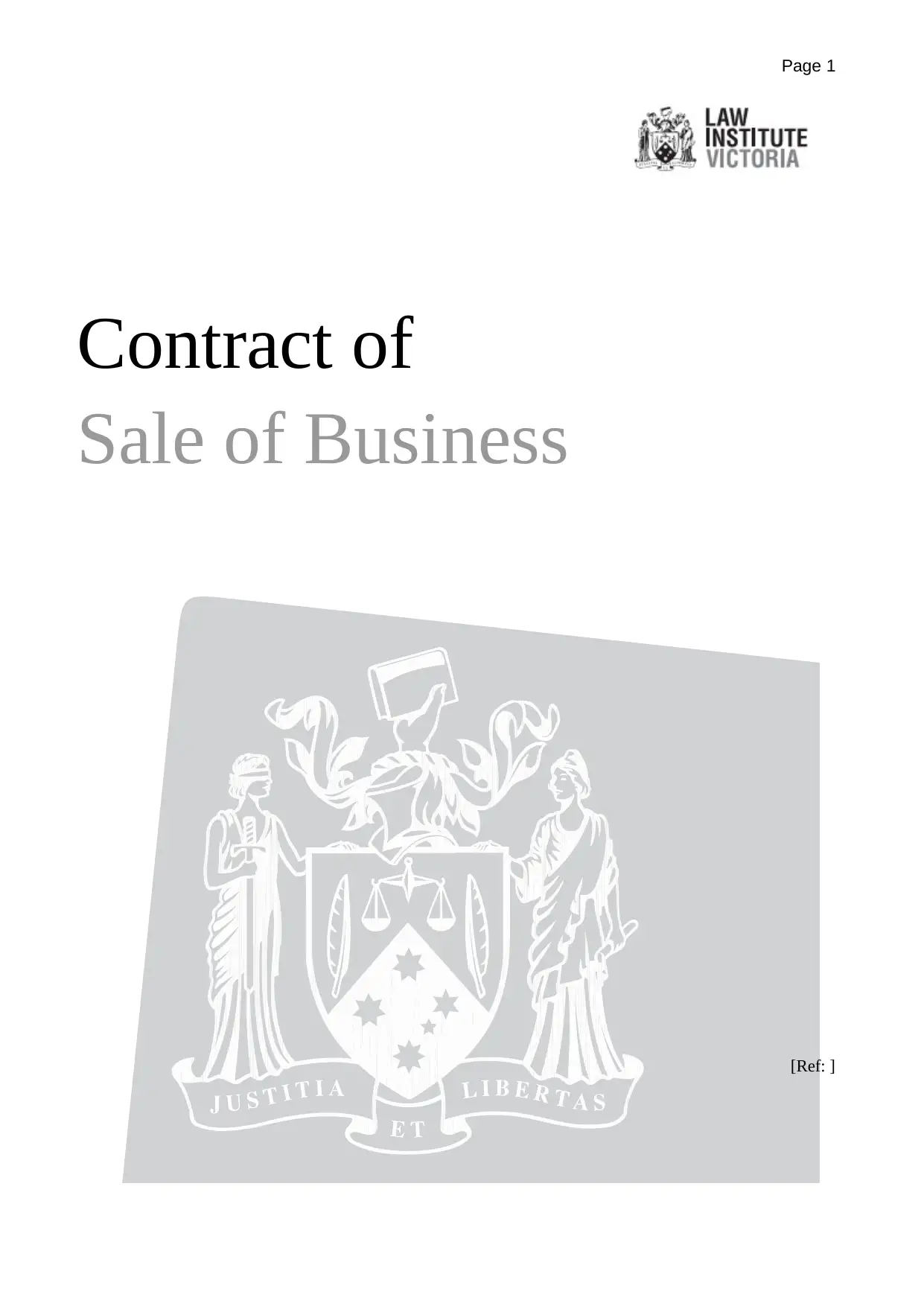
Page 1
Contract of
Sale of Business
[Ref: ]
Contract of
Sale of Business
[Ref: ]
Secure Best Marks with AI Grader
Need help grading? Try our AI Grader for instant feedback on your assignments.
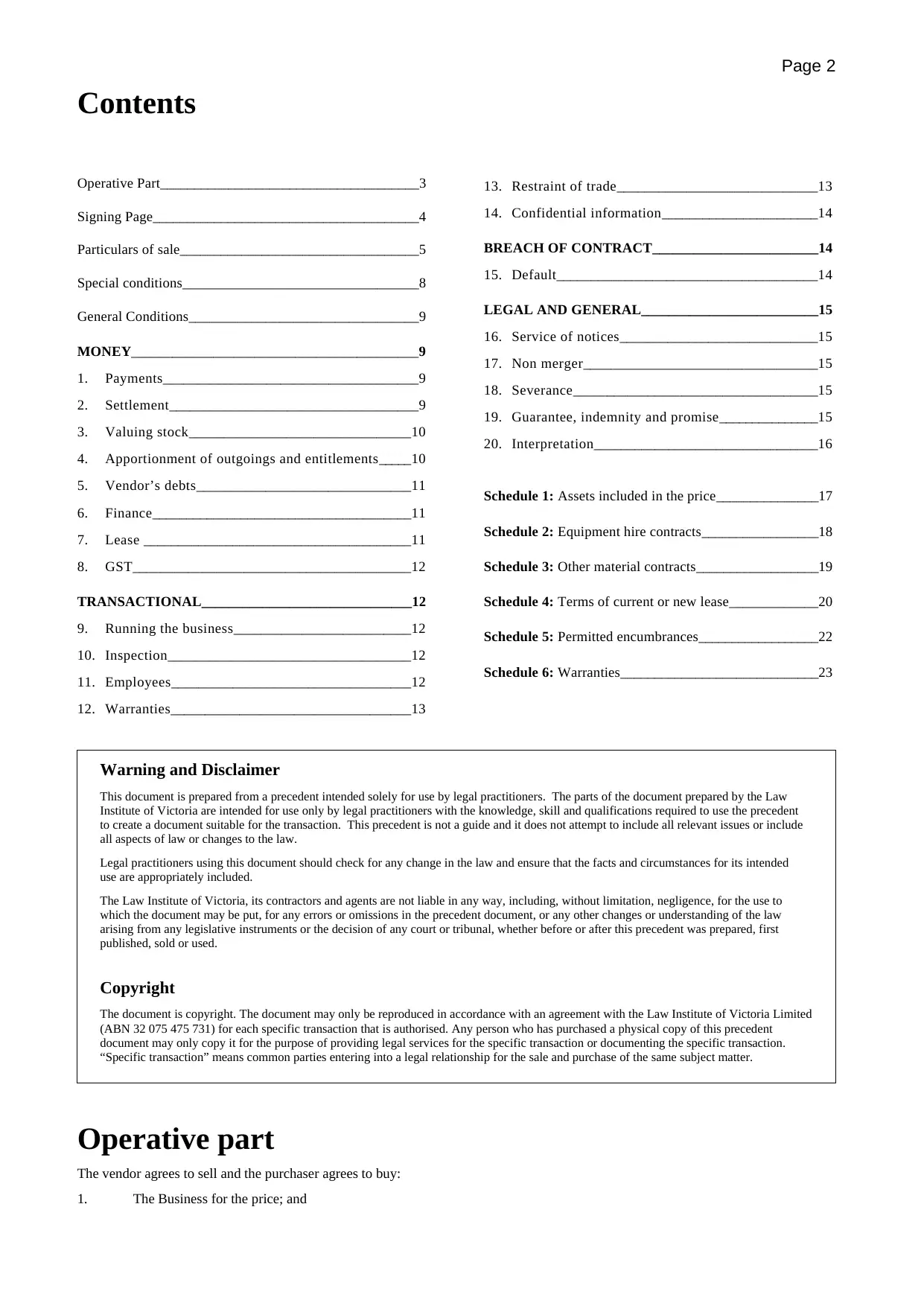
Page 2
Contents
Operative Part______________________________________3
Signing Page_______________________________________4
Particulars of sale___________________________________5
Special conditions__________________________________8
General Conditions_________________________________9
MONEY__________________________________________9
1. Payments_____________________________________9
2. Settlement____________________________________9
3. Valuing stock________________________________10
4. Apportionment of outgoings and entitlements_____10
5. Vendor’s debts_______________________________11
6. Finance______________________________________11
7. Lease _______________________________________11
8. GST________________________________________12
TRANSACTIONAL_______________________________12
9. Running the business__________________________12
10. Inspection___________________________________12
11. Employees___________________________________12
12. Warranties___________________________________13
13. Restraint of trade_____________________________13
14. Confidential information_______________________14
BREACH OF CONTRACT________________________14
15. Default______________________________________14
LEGAL AND GENERAL__________________________15
16. Service of notices_____________________________15
17. Non merger__________________________________15
18. Severance____________________________________15
19. Guarantee, indemnity and promise_______________15
20. Interpretation_________________________________16
Schedule 1: Assets included in the price_______________17
Schedule 2: Equipment hire contracts_________________18
Schedule 3: Other material contracts__________________19
Schedule 4: Terms of current or new lease_____________20
Schedule 5: Permitted encumbrances__________________22
Schedule 6: Warranties_____________________________23
Warning and Disclaimer
This document is prepared from a precedent intended solely for use by legal practitioners. The parts of the document prepared by the Law
Institute of Victoria are intended for use only by legal practitioners with the knowledge, skill and qualifications required to use the precedent
to create a document suitable for the transaction. This precedent is not a guide and it does not attempt to include all relevant issues or include
all aspects of law or changes to the law.
Legal practitioners using this document should check for any change in the law and ensure that the facts and circumstances for its intended
use are appropriately included.
The Law Institute of Victoria, its contractors and agents are not liable in any way, including, without limitation, negligence, for the use to
which the document may be put, for any errors or omissions in the precedent document, or any other changes or understanding of the law
arising from any legislative instruments or the decision of any court or tribunal, whether before or after this precedent was prepared, first
published, sold or used.
Copyright
The document is copyright. The document may only be reproduced in accordance with an agreement with the Law Institute of Victoria Limited
(ABN 32 075 475 731) for each specific transaction that is authorised. Any person who has purchased a physical copy of this precedent
document may only copy it for the purpose of providing legal services for the specific transaction or documenting the specific transaction.
“Specific transaction” means common parties entering into a legal relationship for the sale and purchase of the same subject matter.
Operative part
The vendor agrees to sell and the purchaser agrees to buy:
1. The Business for the price; and
Contents
Operative Part______________________________________3
Signing Page_______________________________________4
Particulars of sale___________________________________5
Special conditions__________________________________8
General Conditions_________________________________9
MONEY__________________________________________9
1. Payments_____________________________________9
2. Settlement____________________________________9
3. Valuing stock________________________________10
4. Apportionment of outgoings and entitlements_____10
5. Vendor’s debts_______________________________11
6. Finance______________________________________11
7. Lease _______________________________________11
8. GST________________________________________12
TRANSACTIONAL_______________________________12
9. Running the business__________________________12
10. Inspection___________________________________12
11. Employees___________________________________12
12. Warranties___________________________________13
13. Restraint of trade_____________________________13
14. Confidential information_______________________14
BREACH OF CONTRACT________________________14
15. Default______________________________________14
LEGAL AND GENERAL__________________________15
16. Service of notices_____________________________15
17. Non merger__________________________________15
18. Severance____________________________________15
19. Guarantee, indemnity and promise_______________15
20. Interpretation_________________________________16
Schedule 1: Assets included in the price_______________17
Schedule 2: Equipment hire contracts_________________18
Schedule 3: Other material contracts__________________19
Schedule 4: Terms of current or new lease_____________20
Schedule 5: Permitted encumbrances__________________22
Schedule 6: Warranties_____________________________23
Warning and Disclaimer
This document is prepared from a precedent intended solely for use by legal practitioners. The parts of the document prepared by the Law
Institute of Victoria are intended for use only by legal practitioners with the knowledge, skill and qualifications required to use the precedent
to create a document suitable for the transaction. This precedent is not a guide and it does not attempt to include all relevant issues or include
all aspects of law or changes to the law.
Legal practitioners using this document should check for any change in the law and ensure that the facts and circumstances for its intended
use are appropriately included.
The Law Institute of Victoria, its contractors and agents are not liable in any way, including, without limitation, negligence, for the use to
which the document may be put, for any errors or omissions in the precedent document, or any other changes or understanding of the law
arising from any legislative instruments or the decision of any court or tribunal, whether before or after this precedent was prepared, first
published, sold or used.
Copyright
The document is copyright. The document may only be reproduced in accordance with an agreement with the Law Institute of Victoria Limited
(ABN 32 075 475 731) for each specific transaction that is authorised. Any person who has purchased a physical copy of this precedent
document may only copy it for the purpose of providing legal services for the specific transaction or documenting the specific transaction.
“Specific transaction” means common parties entering into a legal relationship for the sale and purchase of the same subject matter.
Operative part
The vendor agrees to sell and the purchaser agrees to buy:
1. The Business for the price; and
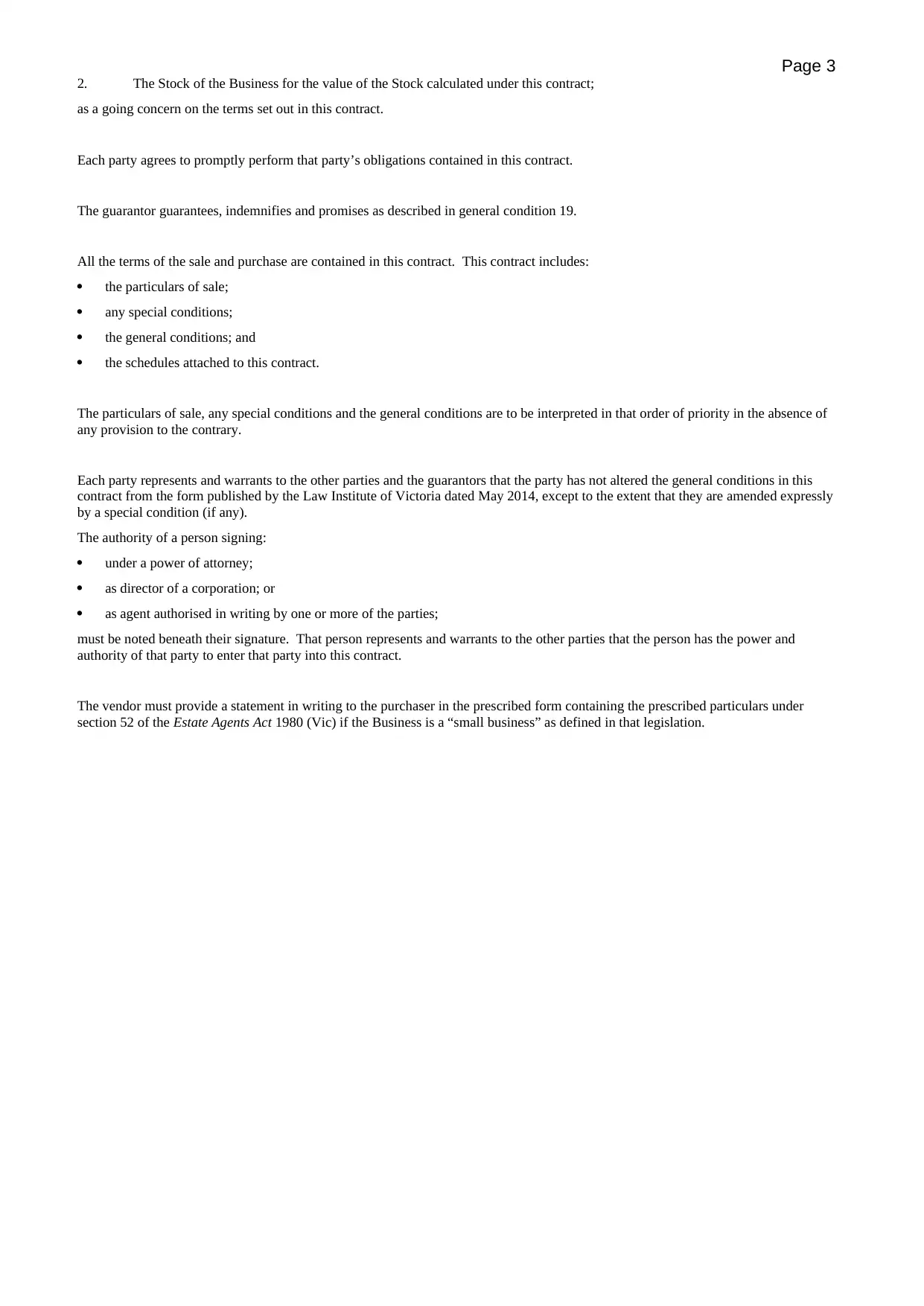
Page 3
2. The Stock of the Business for the value of the Stock calculated under this contract;
as a going concern on the terms set out in this contract.
Each party agrees to promptly perform that party’s obligations contained in this contract.
The guarantor guarantees, indemnifies and promises as described in general condition 19.
All the terms of the sale and purchase are contained in this contract. This contract includes:
the particulars of sale;
any special conditions;
the general conditions; and
the schedules attached to this contract.
The particulars of sale, any special conditions and the general conditions are to be interpreted in that order of priority in the absence of
any provision to the contrary.
Each party represents and warrants to the other parties and the guarantors that the party has not altered the general conditions in this
contract from the form published by the Law Institute of Victoria dated May 2014, except to the extent that they are amended expressly
by a special condition (if any).
The authority of a person signing:
under a power of attorney;
as director of a corporation; or
as agent authorised in writing by one or more of the parties;
must be noted beneath their signature. That person represents and warrants to the other parties that the person has the power and
authority of that party to enter that party into this contract.
The vendor must provide a statement in writing to the purchaser in the prescribed form containing the prescribed particulars under
section 52 of the Estate Agents Act 1980 (Vic) if the Business is a “small business” as defined in that legislation.
2. The Stock of the Business for the value of the Stock calculated under this contract;
as a going concern on the terms set out in this contract.
Each party agrees to promptly perform that party’s obligations contained in this contract.
The guarantor guarantees, indemnifies and promises as described in general condition 19.
All the terms of the sale and purchase are contained in this contract. This contract includes:
the particulars of sale;
any special conditions;
the general conditions; and
the schedules attached to this contract.
The particulars of sale, any special conditions and the general conditions are to be interpreted in that order of priority in the absence of
any provision to the contrary.
Each party represents and warrants to the other parties and the guarantors that the party has not altered the general conditions in this
contract from the form published by the Law Institute of Victoria dated May 2014, except to the extent that they are amended expressly
by a special condition (if any).
The authority of a person signing:
under a power of attorney;
as director of a corporation; or
as agent authorised in writing by one or more of the parties;
must be noted beneath their signature. That person represents and warrants to the other parties that the person has the power and
authority of that party to enter that party into this contract.
The vendor must provide a statement in writing to the purchaser in the prescribed form containing the prescribed particulars under
section 52 of the Estate Agents Act 1980 (Vic) if the Business is a “small business” as defined in that legislation.
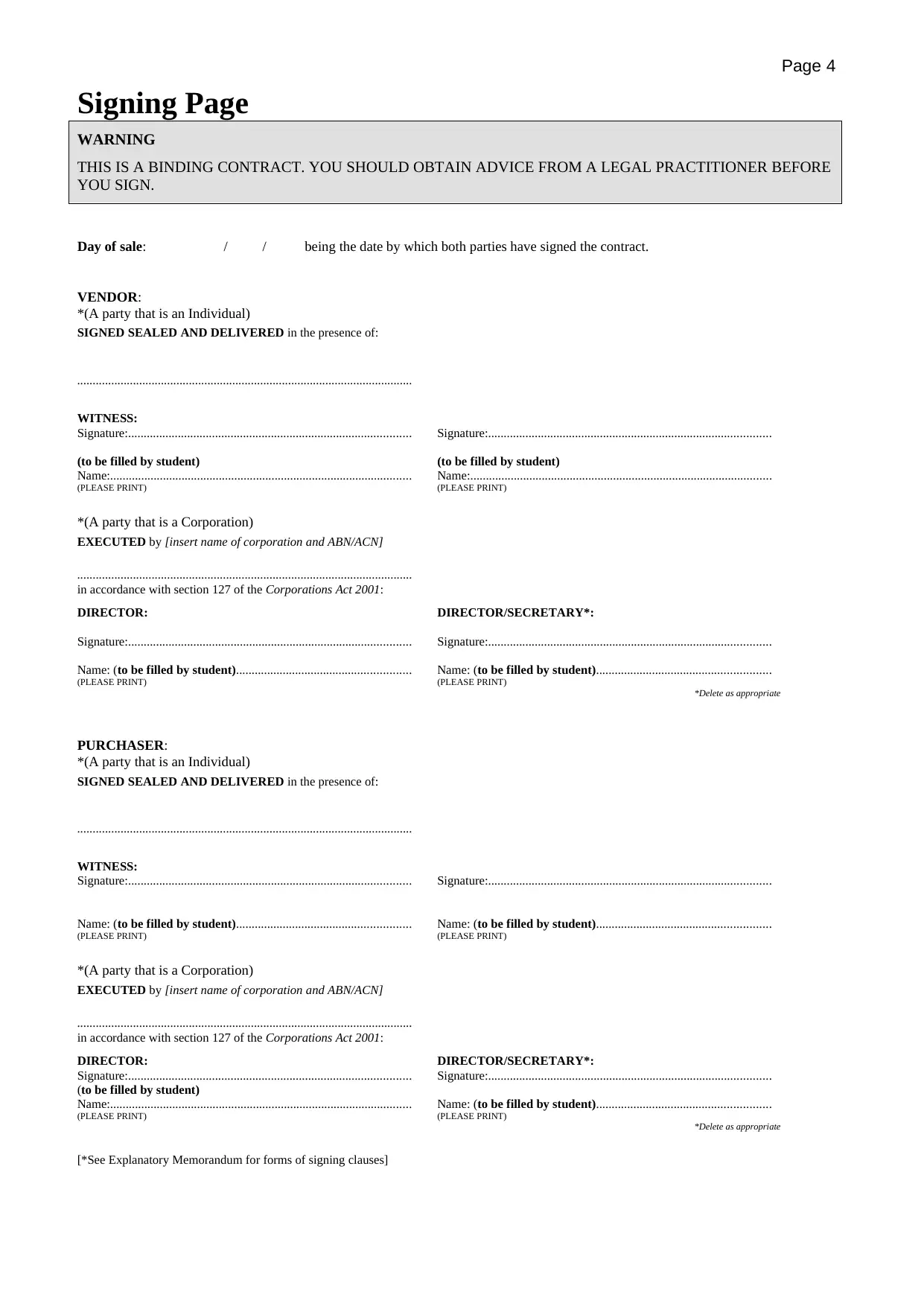
Page 4
Signing Page
WARNING
THIS IS A BINDING CONTRACT. YOU SHOULD OBTAIN ADVICE FROM A LEGAL PRACTITIONER BEFORE
YOU SIGN.
Day of sale: / / being the date by which both parties have signed the contract.
VENDOR:
*(A party that is an Individual)
SIGNED SEALED AND DELIVERED in the presence of:
............................................................................................................
WITNESS:
Signature:...........................................................................................
(to be filled by student)
Name:.................................................................................................
(PLEASE PRINT)
Signature:...........................................................................................
(to be filled by student)
Name:.................................................................................................
(PLEASE PRINT)
*(A party that is a Corporation)
EXECUTED by [insert name of corporation and ABN/ACN]
............................................................................................................
in accordance with section 127 of the Corporations Act 2001:
DIRECTOR:
Signature:...........................................................................................
Name: (to be filled by student)........................................................
(PLEASE PRINT)
DIRECTOR/SECRETARY*:
Signature:...........................................................................................
Name: (to be filled by student)........................................................
(PLEASE PRINT)
*Delete as appropriate
PURCHASER:
*(A party that is an Individual)
SIGNED SEALED AND DELIVERED in the presence of:
............................................................................................................
WITNESS:
Signature:...........................................................................................
Name: (to be filled by student)........................................................
(PLEASE PRINT)
Signature:...........................................................................................
Name: (to be filled by student)........................................................
(PLEASE PRINT)
*(A party that is a Corporation)
EXECUTED by [insert name of corporation and ABN/ACN]
............................................................................................................
in accordance with section 127 of the Corporations Act 2001:
DIRECTOR:
Signature:...........................................................................................
(to be filled by student)
Name:.................................................................................................
(PLEASE PRINT)
DIRECTOR/SECRETARY*:
Signature:...........................................................................................
Name: (to be filled by student)........................................................
(PLEASE PRINT)
*Delete as appropriate
[*See Explanatory Memorandum for forms of signing clauses]
Signing Page
WARNING
THIS IS A BINDING CONTRACT. YOU SHOULD OBTAIN ADVICE FROM A LEGAL PRACTITIONER BEFORE
YOU SIGN.
Day of sale: / / being the date by which both parties have signed the contract.
VENDOR:
*(A party that is an Individual)
SIGNED SEALED AND DELIVERED in the presence of:
............................................................................................................
WITNESS:
Signature:...........................................................................................
(to be filled by student)
Name:.................................................................................................
(PLEASE PRINT)
Signature:...........................................................................................
(to be filled by student)
Name:.................................................................................................
(PLEASE PRINT)
*(A party that is a Corporation)
EXECUTED by [insert name of corporation and ABN/ACN]
............................................................................................................
in accordance with section 127 of the Corporations Act 2001:
DIRECTOR:
Signature:...........................................................................................
Name: (to be filled by student)........................................................
(PLEASE PRINT)
DIRECTOR/SECRETARY*:
Signature:...........................................................................................
Name: (to be filled by student)........................................................
(PLEASE PRINT)
*Delete as appropriate
PURCHASER:
*(A party that is an Individual)
SIGNED SEALED AND DELIVERED in the presence of:
............................................................................................................
WITNESS:
Signature:...........................................................................................
Name: (to be filled by student)........................................................
(PLEASE PRINT)
Signature:...........................................................................................
Name: (to be filled by student)........................................................
(PLEASE PRINT)
*(A party that is a Corporation)
EXECUTED by [insert name of corporation and ABN/ACN]
............................................................................................................
in accordance with section 127 of the Corporations Act 2001:
DIRECTOR:
Signature:...........................................................................................
(to be filled by student)
Name:.................................................................................................
(PLEASE PRINT)
DIRECTOR/SECRETARY*:
Signature:...........................................................................................
Name: (to be filled by student)........................................................
(PLEASE PRINT)
*Delete as appropriate
[*See Explanatory Memorandum for forms of signing clauses]
Secure Best Marks with AI Grader
Need help grading? Try our AI Grader for instant feedback on your assignments.
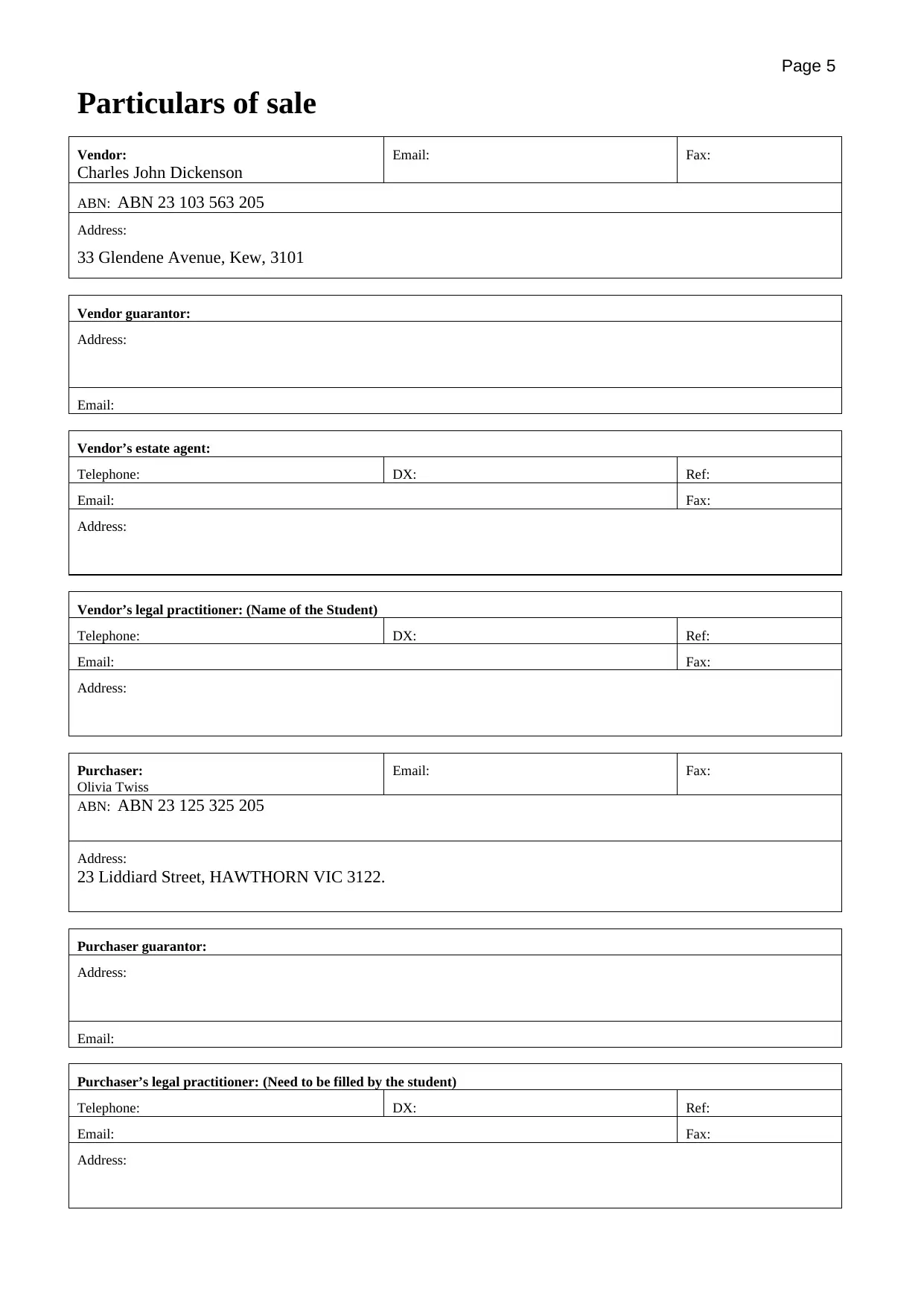
Page 5
Particulars of sale
Vendor:
Charles John Dickenson
Email: Fax:
ABN: ABN 23 103 563 205
Address:
33 Glendene Avenue, Kew, 3101
Vendor guarantor:
Address:
Email:
Vendor’s estate agent:
Telephone: DX: Ref:
Email: Fax:
Address:
Vendor’s legal practitioner: (Name of the Student)
Telephone: DX: Ref:
Email: Fax:
Address:
Purchaser:
Olivia Twiss
Email: Fax:
ABN: ABN 23 125 325 205
Address:
23 Liddiard Street, HAWTHORN VIC 3122.
Purchaser guarantor:
Address:
Email:
Purchaser’s legal practitioner: (Need to be filled by the student)
Telephone: DX: Ref:
Email: Fax:
Address:
Particulars of sale
Vendor:
Charles John Dickenson
Email: Fax:
ABN: ABN 23 103 563 205
Address:
33 Glendene Avenue, Kew, 3101
Vendor guarantor:
Address:
Email:
Vendor’s estate agent:
Telephone: DX: Ref:
Email: Fax:
Address:
Vendor’s legal practitioner: (Name of the Student)
Telephone: DX: Ref:
Email: Fax:
Address:
Purchaser:
Olivia Twiss
Email: Fax:
ABN: ABN 23 125 325 205
Address:
23 Liddiard Street, HAWTHORN VIC 3122.
Purchaser guarantor:
Address:
Email:
Purchaser’s legal practitioner: (Need to be filled by the student)
Telephone: DX: Ref:
Email: Fax:
Address:
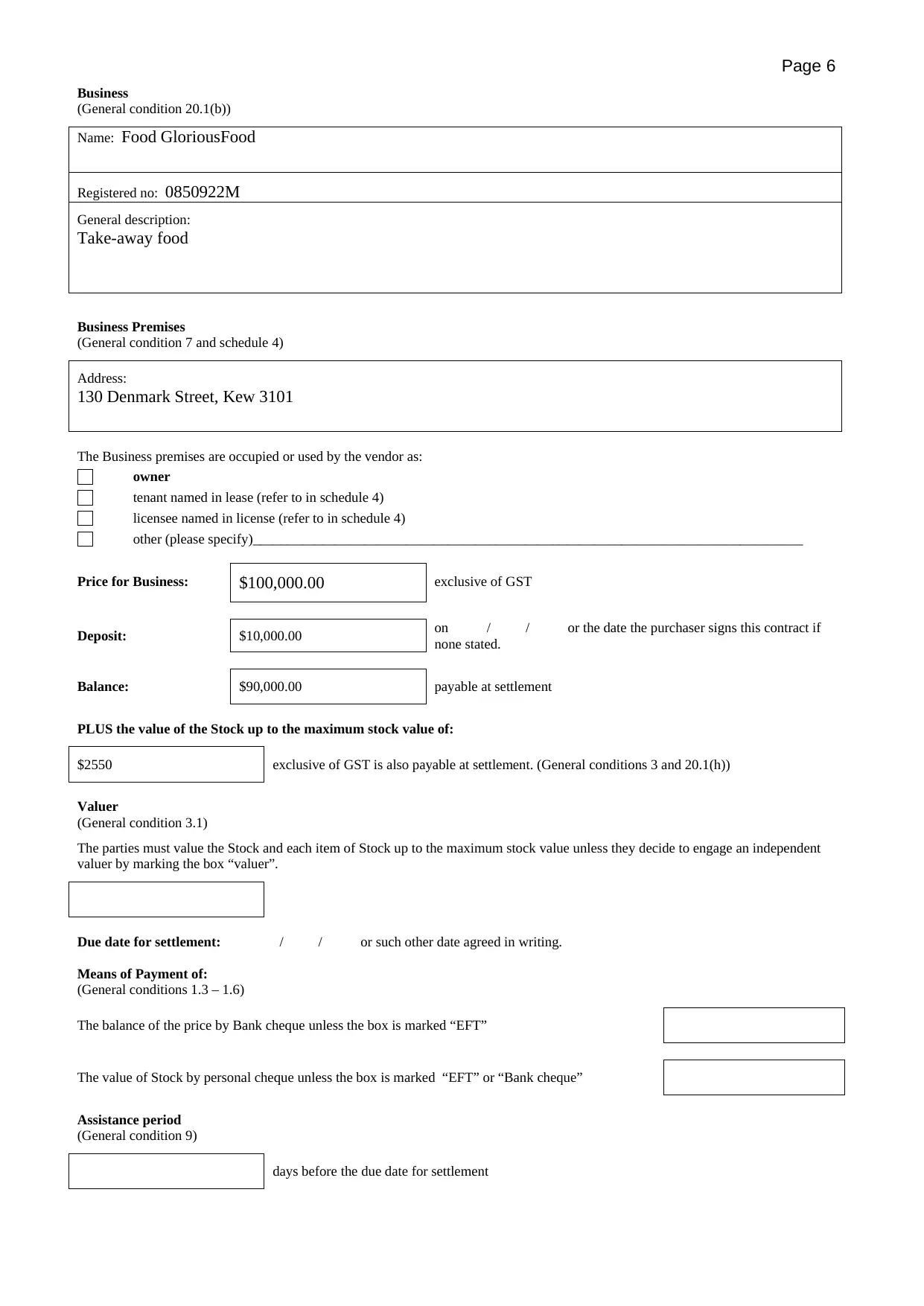
Page 6
Business
(General condition 20.1(b))
Name: Food GloriousFood
Registered no: 0850922M
General description:
Take-away food
Business Premises
(General condition 7 and schedule 4)
Address:
130 Denmark Street, Kew 3101
The Business premises are occupied or used by the vendor as:
owner
tenant named in lease (refer to in schedule 4)
licensee named in license (refer to in schedule 4)
other (please specify)_______________________________________________________________________________
Price for Business: $100,000.00 exclusive of GST
Deposit: $10,000.00 on / / or the date the purchaser signs this contract if
none stated.
Balance: $90,000.00 payable at settlement
PLUS the value of the Stock up to the maximum stock value of:
$2550 exclusive of GST is also payable at settlement. (General conditions 3 and 20.1(h))
Valuer
(General condition 3.1)
The parties must value the Stock and each item of Stock up to the maximum stock value unless they decide to engage an independent
valuer by marking the box “valuer”.
Due date for settlement: / / or such other date agreed in writing.
Means of Payment of:
(General conditions 1.3 – 1.6)
The balance of the price by Bank cheque unless the box is marked “EFT”
The value of Stock by personal cheque unless the box is marked “EFT” or “Bank cheque”
Assistance period
(General condition 9)
days before the due date for settlement
Business
(General condition 20.1(b))
Name: Food GloriousFood
Registered no: 0850922M
General description:
Take-away food
Business Premises
(General condition 7 and schedule 4)
Address:
130 Denmark Street, Kew 3101
The Business premises are occupied or used by the vendor as:
owner
tenant named in lease (refer to in schedule 4)
licensee named in license (refer to in schedule 4)
other (please specify)_______________________________________________________________________________
Price for Business: $100,000.00 exclusive of GST
Deposit: $10,000.00 on / / or the date the purchaser signs this contract if
none stated.
Balance: $90,000.00 payable at settlement
PLUS the value of the Stock up to the maximum stock value of:
$2550 exclusive of GST is also payable at settlement. (General conditions 3 and 20.1(h))
Valuer
(General condition 3.1)
The parties must value the Stock and each item of Stock up to the maximum stock value unless they decide to engage an independent
valuer by marking the box “valuer”.
Due date for settlement: / / or such other date agreed in writing.
Means of Payment of:
(General conditions 1.3 – 1.6)
The balance of the price by Bank cheque unless the box is marked “EFT”
The value of Stock by personal cheque unless the box is marked “EFT” or “Bank cheque”
Assistance period
(General condition 9)
days before the due date for settlement
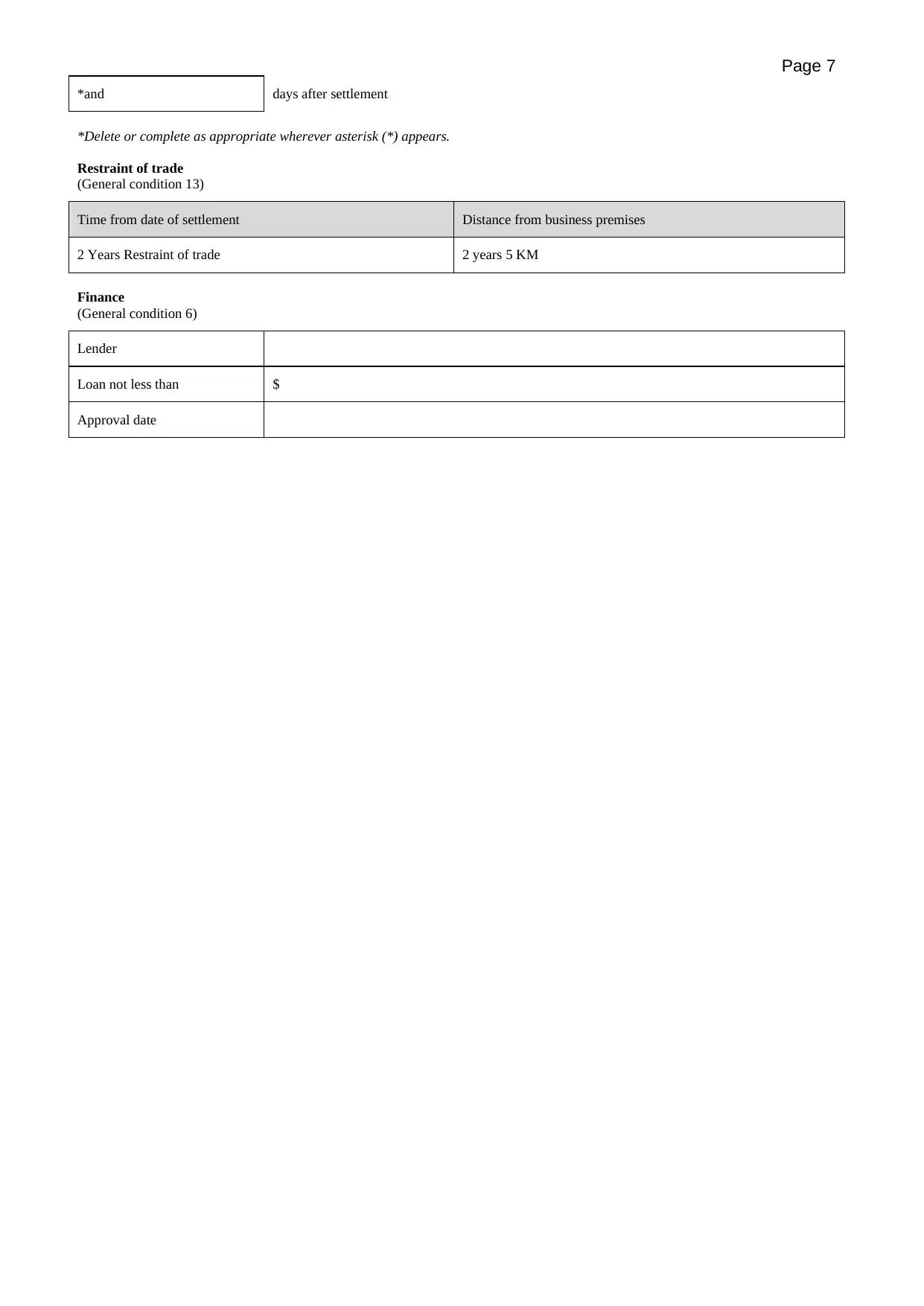
Page 7
*and days after settlement
*Delete or complete as appropriate wherever asterisk (*) appears.
Restraint of trade
(General condition 13)
Time from date of settlement Distance from business premises
2 Years Restraint of trade 2 years 5 KM
Finance
(General condition 6)
Lender
Loan not less than $
Approval date
*and days after settlement
*Delete or complete as appropriate wherever asterisk (*) appears.
Restraint of trade
(General condition 13)
Time from date of settlement Distance from business premises
2 Years Restraint of trade 2 years 5 KM
Finance
(General condition 6)
Lender
Loan not less than $
Approval date
Paraphrase This Document
Need a fresh take? Get an instant paraphrase of this document with our AI Paraphraser
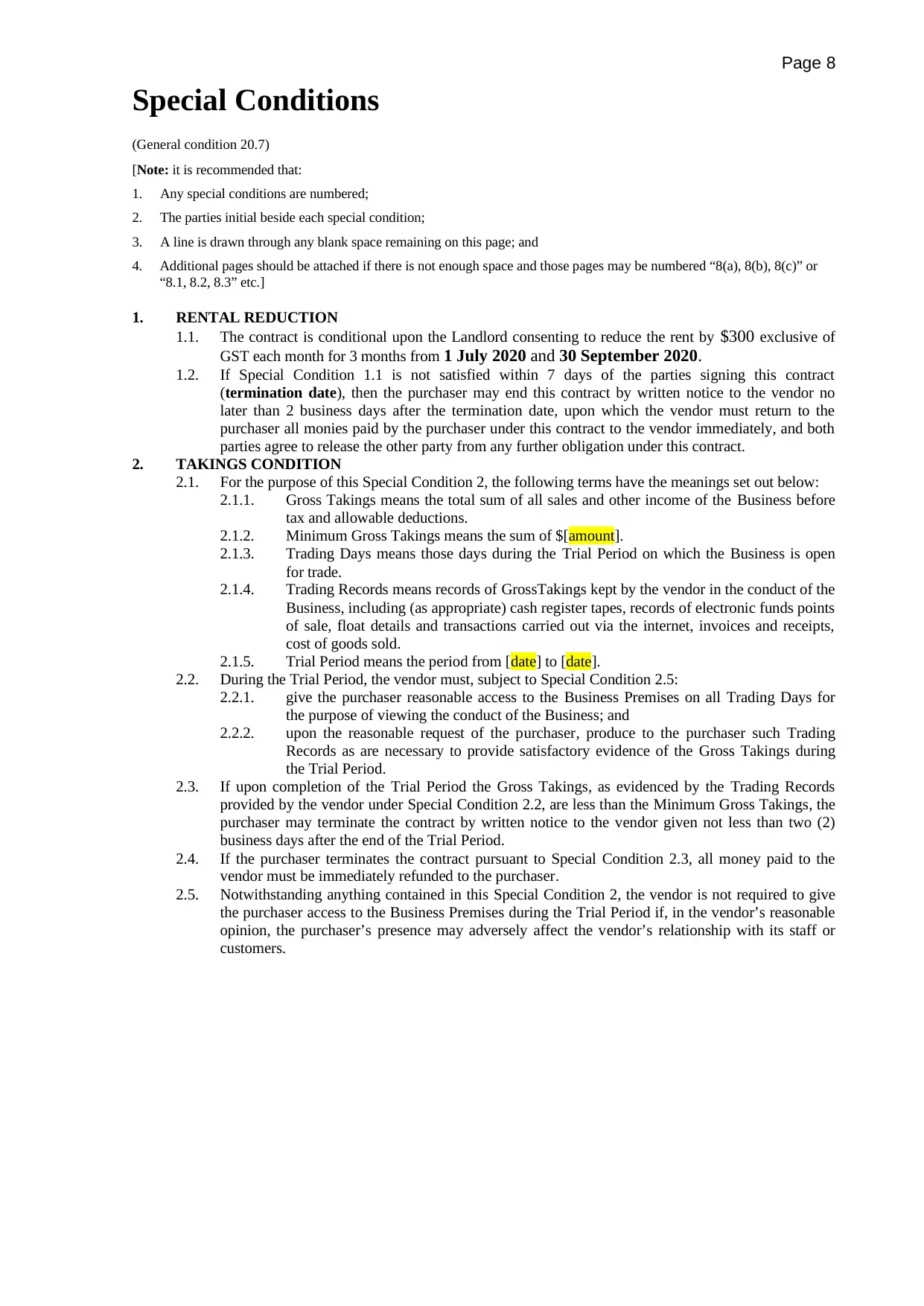
Page 8
Special Conditions
(General condition 20.7)
[Note: it is recommended that:
1. Any special conditions are numbered;
2. The parties initial beside each special condition;
3. A line is drawn through any blank space remaining on this page; and
4. Additional pages should be attached if there is not enough space and those pages may be numbered “8(a), 8(b), 8(c)” or
“8.1, 8.2, 8.3” etc.]
1. RENTAL REDUCTION
1.1. The contract is conditional upon the Landlord consenting to reduce the rent by $300 exclusive of
GST each month for 3 months from 1 July 2020 and 30 September 2020.
1.2. If Special Condition 1.1 is not satisfied within 7 days of the parties signing this contract
(termination date), then the purchaser may end this contract by written notice to the vendor no
later than 2 business days after the termination date, upon which the vendor must return to the
purchaser all monies paid by the purchaser under this contract to the vendor immediately, and both
parties agree to release the other party from any further obligation under this contract.
2. TAKINGS CONDITION
2.1. For the purpose of this Special Condition 2, the following terms have the meanings set out below:
2.1.1. Gross Takings means the total sum of all sales and other income of the Business before
tax and allowable deductions.
2.1.2. Minimum Gross Takings means the sum of $[amount].
2.1.3. Trading Days means those days during the Trial Period on which the Business is open
for trade.
2.1.4. Trading Records means records of GrossTakings kept by the vendor in the conduct of the
Business, including (as appropriate) cash register tapes, records of electronic funds points
of sale, float details and transactions carried out via the internet, invoices and receipts,
cost of goods sold.
2.1.5. Trial Period means the period from [date] to [date].
2.2. During the Trial Period, the vendor must, subject to Special Condition 2.5:
2.2.1. give the purchaser reasonable access to the Business Premises on all Trading Days for
the purpose of viewing the conduct of the Business; and
2.2.2. upon the reasonable request of the purchaser, produce to the purchaser such Trading
Records as are necessary to provide satisfactory evidence of the Gross Takings during
the Trial Period.
2.3. If upon completion of the Trial Period the Gross Takings, as evidenced by the Trading Records
provided by the vendor under Special Condition 2.2, are less than the Minimum Gross Takings, the
purchaser may terminate the contract by written notice to the vendor given not less than two (2)
business days after the end of the Trial Period.
2.4. If the purchaser terminates the contract pursuant to Special Condition 2.3, all money paid to the
vendor must be immediately refunded to the purchaser.
2.5. Notwithstanding anything contained in this Special Condition 2, the vendor is not required to give
the purchaser access to the Business Premises during the Trial Period if, in the vendor’s reasonable
opinion, the purchaser’s presence may adversely affect the vendor’s relationship with its staff or
customers.
Special Conditions
(General condition 20.7)
[Note: it is recommended that:
1. Any special conditions are numbered;
2. The parties initial beside each special condition;
3. A line is drawn through any blank space remaining on this page; and
4. Additional pages should be attached if there is not enough space and those pages may be numbered “8(a), 8(b), 8(c)” or
“8.1, 8.2, 8.3” etc.]
1. RENTAL REDUCTION
1.1. The contract is conditional upon the Landlord consenting to reduce the rent by $300 exclusive of
GST each month for 3 months from 1 July 2020 and 30 September 2020.
1.2. If Special Condition 1.1 is not satisfied within 7 days of the parties signing this contract
(termination date), then the purchaser may end this contract by written notice to the vendor no
later than 2 business days after the termination date, upon which the vendor must return to the
purchaser all monies paid by the purchaser under this contract to the vendor immediately, and both
parties agree to release the other party from any further obligation under this contract.
2. TAKINGS CONDITION
2.1. For the purpose of this Special Condition 2, the following terms have the meanings set out below:
2.1.1. Gross Takings means the total sum of all sales and other income of the Business before
tax and allowable deductions.
2.1.2. Minimum Gross Takings means the sum of $[amount].
2.1.3. Trading Days means those days during the Trial Period on which the Business is open
for trade.
2.1.4. Trading Records means records of GrossTakings kept by the vendor in the conduct of the
Business, including (as appropriate) cash register tapes, records of electronic funds points
of sale, float details and transactions carried out via the internet, invoices and receipts,
cost of goods sold.
2.1.5. Trial Period means the period from [date] to [date].
2.2. During the Trial Period, the vendor must, subject to Special Condition 2.5:
2.2.1. give the purchaser reasonable access to the Business Premises on all Trading Days for
the purpose of viewing the conduct of the Business; and
2.2.2. upon the reasonable request of the purchaser, produce to the purchaser such Trading
Records as are necessary to provide satisfactory evidence of the Gross Takings during
the Trial Period.
2.3. If upon completion of the Trial Period the Gross Takings, as evidenced by the Trading Records
provided by the vendor under Special Condition 2.2, are less than the Minimum Gross Takings, the
purchaser may terminate the contract by written notice to the vendor given not less than two (2)
business days after the end of the Trial Period.
2.4. If the purchaser terminates the contract pursuant to Special Condition 2.3, all money paid to the
vendor must be immediately refunded to the purchaser.
2.5. Notwithstanding anything contained in this Special Condition 2, the vendor is not required to give
the purchaser access to the Business Premises during the Trial Period if, in the vendor’s reasonable
opinion, the purchaser’s presence may adversely affect the vendor’s relationship with its staff or
customers.
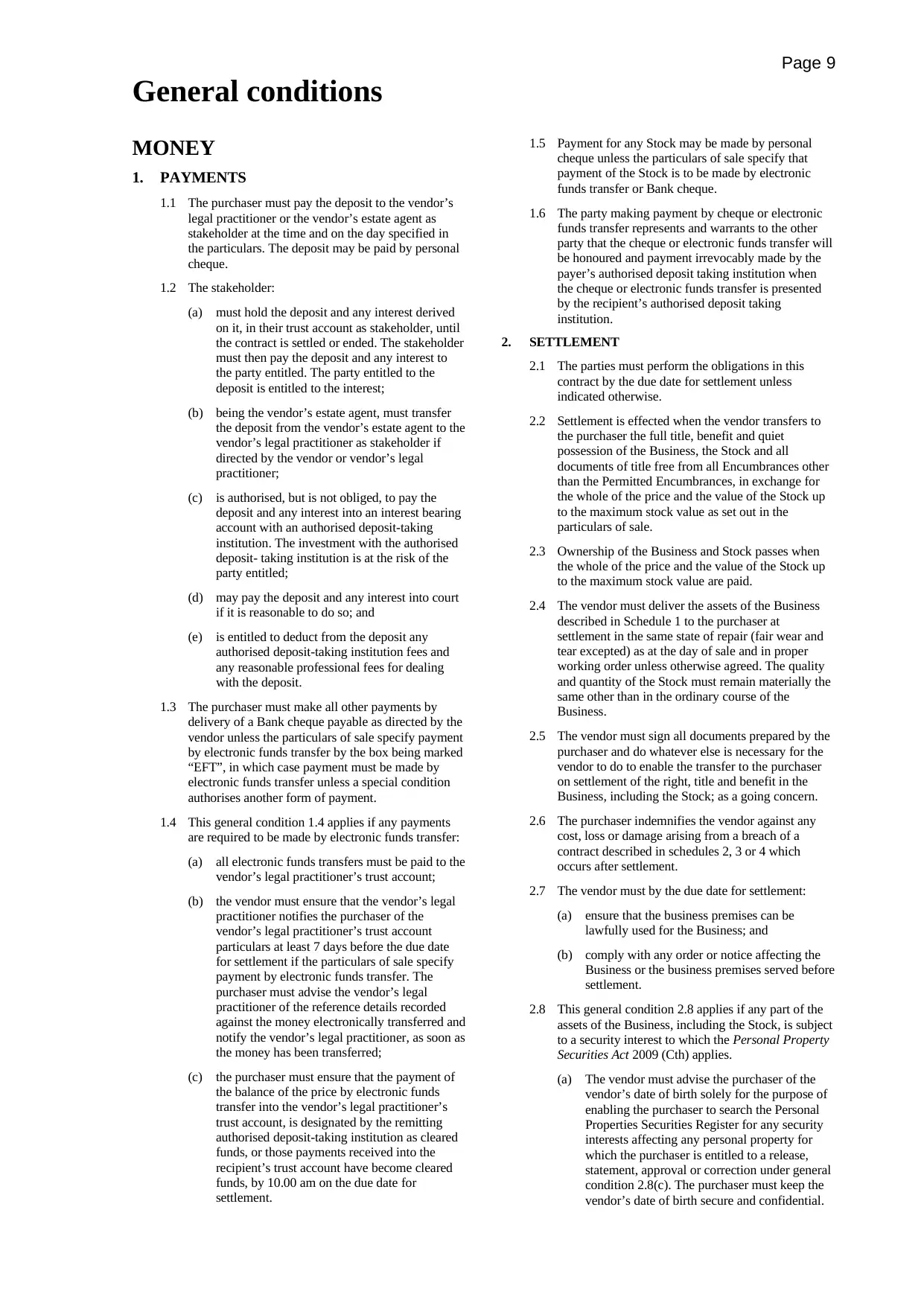
Page 9
General conditions
MONEY
1. PAYMENTS
1.1 The purchaser must pay the deposit to the vendor’s
legal practitioner or the vendor’s estate agent as
stakeholder at the time and on the day specified in
the particulars. The deposit may be paid by personal
cheque.
1.2 The stakeholder:
(a) must hold the deposit and any interest derived
on it, in their trust account as stakeholder, until
the contract is settled or ended. The stakeholder
must then pay the deposit and any interest to
the party entitled. The party entitled to the
deposit is entitled to the interest;
(b) being the vendor’s estate agent, must transfer
the deposit from the vendor’s estate agent to the
vendor’s legal practitioner as stakeholder if
directed by the vendor or vendor’s legal
practitioner;
(c) is authorised, but is not obliged, to pay the
deposit and any interest into an interest bearing
account with an authorised deposit-taking
institution. The investment with the authorised
deposit- taking institution is at the risk of the
party entitled;
(d) may pay the deposit and any interest into court
if it is reasonable to do so; and
(e) is entitled to deduct from the deposit any
authorised deposit-taking institution fees and
any reasonable professional fees for dealing
with the deposit.
1.3 The purchaser must make all other payments by
delivery of a Bank cheque payable as directed by the
vendor unless the particulars of sale specify payment
by electronic funds transfer by the box being marked
“EFT”, in which case payment must be made by
electronic funds transfer unless a special condition
authorises another form of payment.
1.4 This general condition 1.4 applies if any payments
are required to be made by electronic funds transfer:
(a) all electronic funds transfers must be paid to the
vendor’s legal practitioner’s trust account;
(b) the vendor must ensure that the vendor’s legal
practitioner notifies the purchaser of the
vendor’s legal practitioner’s trust account
particulars at least 7 days before the due date
for settlement if the particulars of sale specify
payment by electronic funds transfer. The
purchaser must advise the vendor’s legal
practitioner of the reference details recorded
against the money electronically transferred and
notify the vendor’s legal practitioner, as soon as
the money has been transferred;
(c) the purchaser must ensure that the payment of
the balance of the price by electronic funds
transfer into the vendor’s legal practitioner’s
trust account, is designated by the remitting
authorised deposit-taking institution as cleared
funds, or those payments received into the
recipient’s trust account have become cleared
funds, by 10.00 am on the due date for
settlement.
1.5 Payment for any Stock may be made by personal
cheque unless the particulars of sale specify that
payment of the Stock is to be made by electronic
funds transfer or Bank cheque.
1.6 The party making payment by cheque or electronic
funds transfer represents and warrants to the other
party that the cheque or electronic funds transfer will
be honoured and payment irrevocably made by the
payer’s authorised deposit taking institution when
the cheque or electronic funds transfer is presented
by the recipient’s authorised deposit taking
institution.
2. SETTLEMENT
2.1 The parties must perform the obligations in this
contract by the due date for settlement unless
indicated otherwise.
2.2 Settlement is effected when the vendor transfers to
the purchaser the full title, benefit and quiet
possession of the Business, the Stock and all
documents of title free from all Encumbrances other
than the Permitted Encumbrances, in exchange for
the whole of the price and the value of the Stock up
to the maximum stock value as set out in the
particulars of sale.
2.3 Ownership of the Business and Stock passes when
the whole of the price and the value of the Stock up
to the maximum stock value are paid.
2.4 The vendor must deliver the assets of the Business
described in Schedule 1 to the purchaser at
settlement in the same state of repair (fair wear and
tear excepted) as at the day of sale and in proper
working order unless otherwise agreed. The quality
and quantity of the Stock must remain materially the
same other than in the ordinary course of the
Business.
2.5 The vendor must sign all documents prepared by the
purchaser and do whatever else is necessary for the
vendor to do to enable the transfer to the purchaser
on settlement of the right, title and benefit in the
Business, including the Stock; as a going concern.
2.6 The purchaser indemnifies the vendor against any
cost, loss or damage arising from a breach of a
contract described in schedules 2, 3 or 4 which
occurs after settlement.
2.7 The vendor must by the due date for settlement:
(a) ensure that the business premises can be
lawfully used for the Business; and
(b) comply with any order or notice affecting the
Business or the business premises served before
settlement.
2.8 This general condition 2.8 applies if any part of the
assets of the Business, including the Stock, is subject
to a security interest to which the Personal Property
Securities Act 2009 (Cth) applies.
(a) The vendor must advise the purchaser of the
vendor’s date of birth solely for the purpose of
enabling the purchaser to search the Personal
Properties Securities Register for any security
interests affecting any personal property for
which the purchaser is entitled to a release,
statement, approval or correction under general
condition 2.8(c). The purchaser must keep the
vendor’s date of birth secure and confidential.
General conditions
MONEY
1. PAYMENTS
1.1 The purchaser must pay the deposit to the vendor’s
legal practitioner or the vendor’s estate agent as
stakeholder at the time and on the day specified in
the particulars. The deposit may be paid by personal
cheque.
1.2 The stakeholder:
(a) must hold the deposit and any interest derived
on it, in their trust account as stakeholder, until
the contract is settled or ended. The stakeholder
must then pay the deposit and any interest to
the party entitled. The party entitled to the
deposit is entitled to the interest;
(b) being the vendor’s estate agent, must transfer
the deposit from the vendor’s estate agent to the
vendor’s legal practitioner as stakeholder if
directed by the vendor or vendor’s legal
practitioner;
(c) is authorised, but is not obliged, to pay the
deposit and any interest into an interest bearing
account with an authorised deposit-taking
institution. The investment with the authorised
deposit- taking institution is at the risk of the
party entitled;
(d) may pay the deposit and any interest into court
if it is reasonable to do so; and
(e) is entitled to deduct from the deposit any
authorised deposit-taking institution fees and
any reasonable professional fees for dealing
with the deposit.
1.3 The purchaser must make all other payments by
delivery of a Bank cheque payable as directed by the
vendor unless the particulars of sale specify payment
by electronic funds transfer by the box being marked
“EFT”, in which case payment must be made by
electronic funds transfer unless a special condition
authorises another form of payment.
1.4 This general condition 1.4 applies if any payments
are required to be made by electronic funds transfer:
(a) all electronic funds transfers must be paid to the
vendor’s legal practitioner’s trust account;
(b) the vendor must ensure that the vendor’s legal
practitioner notifies the purchaser of the
vendor’s legal practitioner’s trust account
particulars at least 7 days before the due date
for settlement if the particulars of sale specify
payment by electronic funds transfer. The
purchaser must advise the vendor’s legal
practitioner of the reference details recorded
against the money electronically transferred and
notify the vendor’s legal practitioner, as soon as
the money has been transferred;
(c) the purchaser must ensure that the payment of
the balance of the price by electronic funds
transfer into the vendor’s legal practitioner’s
trust account, is designated by the remitting
authorised deposit-taking institution as cleared
funds, or those payments received into the
recipient’s trust account have become cleared
funds, by 10.00 am on the due date for
settlement.
1.5 Payment for any Stock may be made by personal
cheque unless the particulars of sale specify that
payment of the Stock is to be made by electronic
funds transfer or Bank cheque.
1.6 The party making payment by cheque or electronic
funds transfer represents and warrants to the other
party that the cheque or electronic funds transfer will
be honoured and payment irrevocably made by the
payer’s authorised deposit taking institution when
the cheque or electronic funds transfer is presented
by the recipient’s authorised deposit taking
institution.
2. SETTLEMENT
2.1 The parties must perform the obligations in this
contract by the due date for settlement unless
indicated otherwise.
2.2 Settlement is effected when the vendor transfers to
the purchaser the full title, benefit and quiet
possession of the Business, the Stock and all
documents of title free from all Encumbrances other
than the Permitted Encumbrances, in exchange for
the whole of the price and the value of the Stock up
to the maximum stock value as set out in the
particulars of sale.
2.3 Ownership of the Business and Stock passes when
the whole of the price and the value of the Stock up
to the maximum stock value are paid.
2.4 The vendor must deliver the assets of the Business
described in Schedule 1 to the purchaser at
settlement in the same state of repair (fair wear and
tear excepted) as at the day of sale and in proper
working order unless otherwise agreed. The quality
and quantity of the Stock must remain materially the
same other than in the ordinary course of the
Business.
2.5 The vendor must sign all documents prepared by the
purchaser and do whatever else is necessary for the
vendor to do to enable the transfer to the purchaser
on settlement of the right, title and benefit in the
Business, including the Stock; as a going concern.
2.6 The purchaser indemnifies the vendor against any
cost, loss or damage arising from a breach of a
contract described in schedules 2, 3 or 4 which
occurs after settlement.
2.7 The vendor must by the due date for settlement:
(a) ensure that the business premises can be
lawfully used for the Business; and
(b) comply with any order or notice affecting the
Business or the business premises served before
settlement.
2.8 This general condition 2.8 applies if any part of the
assets of the Business, including the Stock, is subject
to a security interest to which the Personal Property
Securities Act 2009 (Cth) applies.
(a) The vendor must advise the purchaser of the
vendor’s date of birth solely for the purpose of
enabling the purchaser to search the Personal
Properties Securities Register for any security
interests affecting any personal property for
which the purchaser is entitled to a release,
statement, approval or correction under general
condition 2.8(c). The purchaser must keep the
vendor’s date of birth secure and confidential.
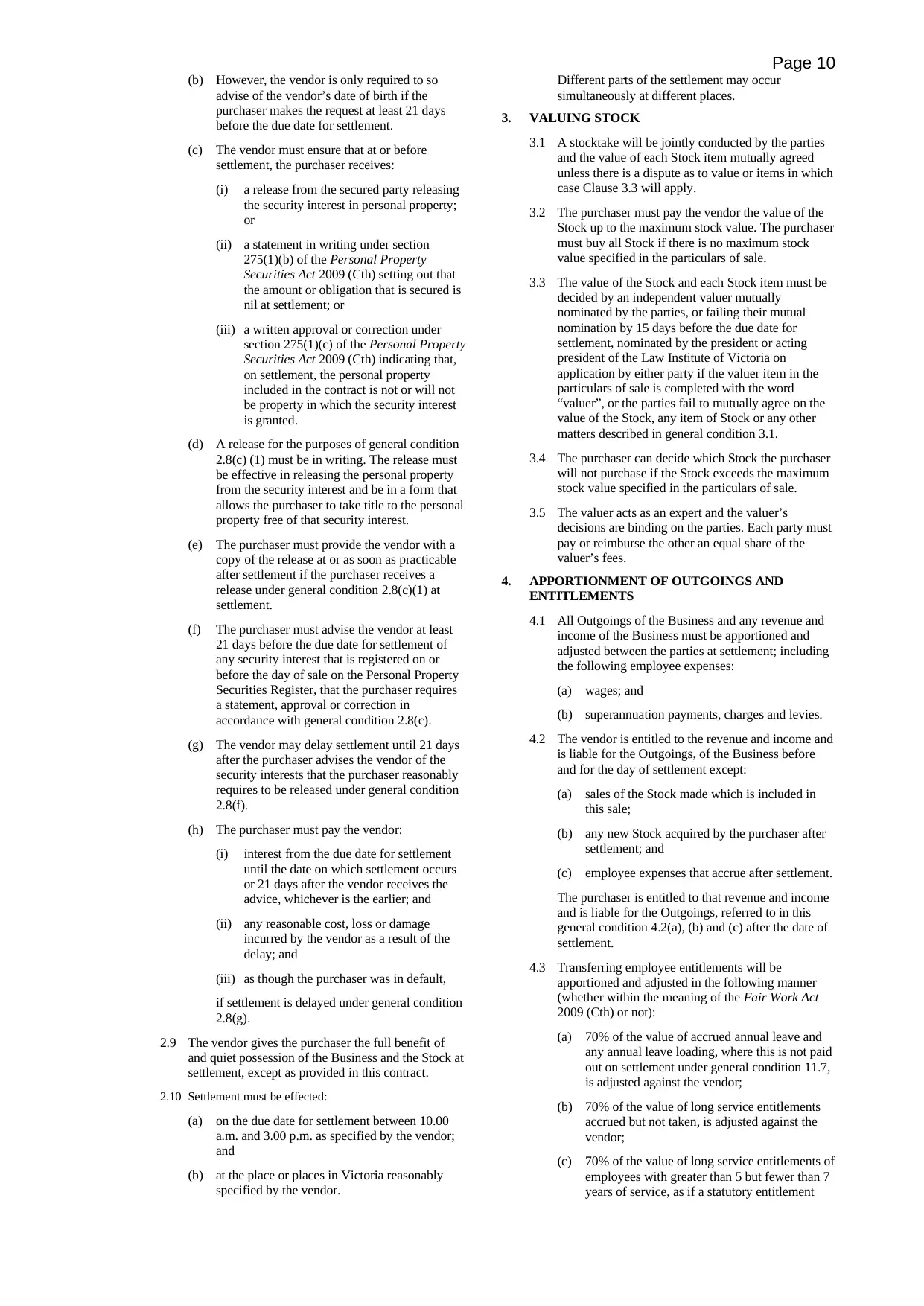
Page 10
(b) However, the vendor is only required to so
advise of the vendor’s date of birth if the
purchaser makes the request at least 21 days
before the due date for settlement.
(c) The vendor must ensure that at or before
settlement, the purchaser receives:
(i) a release from the secured party releasing
the security interest in personal property;
or
(ii) a statement in writing under section
275(1)(b) of the Personal Property
Securities Act 2009 (Cth) setting out that
the amount or obligation that is secured is
nil at settlement; or
(iii) a written approval or correction under
section 275(1)(c) of the Personal Property
Securities Act 2009 (Cth) indicating that,
on settlement, the personal property
included in the contract is not or will not
be property in which the security interest
is granted.
(d) A release for the purposes of general condition
2.8(c) (1) must be in writing. The release must
be effective in releasing the personal property
from the security interest and be in a form that
allows the purchaser to take title to the personal
property free of that security interest.
(e) The purchaser must provide the vendor with a
copy of the release at or as soon as practicable
after settlement if the purchaser receives a
release under general condition 2.8(c)(1) at
settlement.
(f) The purchaser must advise the vendor at least
21 days before the due date for settlement of
any security interest that is registered on or
before the day of sale on the Personal Property
Securities Register, that the purchaser requires
a statement, approval or correction in
accordance with general condition 2.8(c).
(g) The vendor may delay settlement until 21 days
after the purchaser advises the vendor of the
security interests that the purchaser reasonably
requires to be released under general condition
2.8(f).
(h) The purchaser must pay the vendor:
(i) interest from the due date for settlement
until the date on which settlement occurs
or 21 days after the vendor receives the
advice, whichever is the earlier; and
(ii) any reasonable cost, loss or damage
incurred by the vendor as a result of the
delay; and
(iii) as though the purchaser was in default,
if settlement is delayed under general condition
2.8(g).
2.9 The vendor gives the purchaser the full benefit of
and quiet possession of the Business and the Stock at
settlement, except as provided in this contract.
2.10 Settlement must be effected:
(a) on the due date for settlement between 10.00
a.m. and 3.00 p.m. as specified by the vendor;
and
(b) at the place or places in Victoria reasonably
specified by the vendor.
Different parts of the settlement may occur
simultaneously at different places.
3. VALUING STOCK
3.1 A stocktake will be jointly conducted by the parties
and the value of each Stock item mutually agreed
unless there is a dispute as to value or items in which
case Clause 3.3 will apply.
3.2 The purchaser must pay the vendor the value of the
Stock up to the maximum stock value. The purchaser
must buy all Stock if there is no maximum stock
value specified in the particulars of sale.
3.3 The value of the Stock and each Stock item must be
decided by an independent valuer mutually
nominated by the parties, or failing their mutual
nomination by 15 days before the due date for
settlement, nominated by the president or acting
president of the Law Institute of Victoria on
application by either party if the valuer item in the
particulars of sale is completed with the word
“valuer”, or the parties fail to mutually agree on the
value of the Stock, any item of Stock or any other
matters described in general condition 3.1.
3.4 The purchaser can decide which Stock the purchaser
will not purchase if the Stock exceeds the maximum
stock value specified in the particulars of sale.
3.5 The valuer acts as an expert and the valuer’s
decisions are binding on the parties. Each party must
pay or reimburse the other an equal share of the
valuer’s fees.
4. APPORTIONMENT OF OUTGOINGS AND
ENTITLEMENTS
4.1 All Outgoings of the Business and any revenue and
income of the Business must be apportioned and
adjusted between the parties at settlement; including
the following employee expenses:
(a) wages; and
(b) superannuation payments, charges and levies.
4.2 The vendor is entitled to the revenue and income and
is liable for the Outgoings, of the Business before
and for the day of settlement except:
(a) sales of the Stock made which is included in
this sale;
(b) any new Stock acquired by the purchaser after
settlement; and
(c) employee expenses that accrue after settlement.
The purchaser is entitled to that revenue and income
and is liable for the Outgoings, referred to in this
general condition 4.2(a), (b) and (c) after the date of
settlement.
4.3 Transferring employee entitlements will be
apportioned and adjusted in the following manner
(whether within the meaning of the Fair Work Act
2009 (Cth) or not):
(a) 70% of the value of accrued annual leave and
any annual leave loading, where this is not paid
out on settlement under general condition 11.7,
is adjusted against the vendor;
(b) 70% of the value of long service entitlements
accrued but not taken, is adjusted against the
vendor;
(c) 70% of the value of long service entitlements of
employees with greater than 5 but fewer than 7
years of service, as if a statutory entitlement
(b) However, the vendor is only required to so
advise of the vendor’s date of birth if the
purchaser makes the request at least 21 days
before the due date for settlement.
(c) The vendor must ensure that at or before
settlement, the purchaser receives:
(i) a release from the secured party releasing
the security interest in personal property;
or
(ii) a statement in writing under section
275(1)(b) of the Personal Property
Securities Act 2009 (Cth) setting out that
the amount or obligation that is secured is
nil at settlement; or
(iii) a written approval or correction under
section 275(1)(c) of the Personal Property
Securities Act 2009 (Cth) indicating that,
on settlement, the personal property
included in the contract is not or will not
be property in which the security interest
is granted.
(d) A release for the purposes of general condition
2.8(c) (1) must be in writing. The release must
be effective in releasing the personal property
from the security interest and be in a form that
allows the purchaser to take title to the personal
property free of that security interest.
(e) The purchaser must provide the vendor with a
copy of the release at or as soon as practicable
after settlement if the purchaser receives a
release under general condition 2.8(c)(1) at
settlement.
(f) The purchaser must advise the vendor at least
21 days before the due date for settlement of
any security interest that is registered on or
before the day of sale on the Personal Property
Securities Register, that the purchaser requires
a statement, approval or correction in
accordance with general condition 2.8(c).
(g) The vendor may delay settlement until 21 days
after the purchaser advises the vendor of the
security interests that the purchaser reasonably
requires to be released under general condition
2.8(f).
(h) The purchaser must pay the vendor:
(i) interest from the due date for settlement
until the date on which settlement occurs
or 21 days after the vendor receives the
advice, whichever is the earlier; and
(ii) any reasonable cost, loss or damage
incurred by the vendor as a result of the
delay; and
(iii) as though the purchaser was in default,
if settlement is delayed under general condition
2.8(g).
2.9 The vendor gives the purchaser the full benefit of
and quiet possession of the Business and the Stock at
settlement, except as provided in this contract.
2.10 Settlement must be effected:
(a) on the due date for settlement between 10.00
a.m. and 3.00 p.m. as specified by the vendor;
and
(b) at the place or places in Victoria reasonably
specified by the vendor.
Different parts of the settlement may occur
simultaneously at different places.
3. VALUING STOCK
3.1 A stocktake will be jointly conducted by the parties
and the value of each Stock item mutually agreed
unless there is a dispute as to value or items in which
case Clause 3.3 will apply.
3.2 The purchaser must pay the vendor the value of the
Stock up to the maximum stock value. The purchaser
must buy all Stock if there is no maximum stock
value specified in the particulars of sale.
3.3 The value of the Stock and each Stock item must be
decided by an independent valuer mutually
nominated by the parties, or failing their mutual
nomination by 15 days before the due date for
settlement, nominated by the president or acting
president of the Law Institute of Victoria on
application by either party if the valuer item in the
particulars of sale is completed with the word
“valuer”, or the parties fail to mutually agree on the
value of the Stock, any item of Stock or any other
matters described in general condition 3.1.
3.4 The purchaser can decide which Stock the purchaser
will not purchase if the Stock exceeds the maximum
stock value specified in the particulars of sale.
3.5 The valuer acts as an expert and the valuer’s
decisions are binding on the parties. Each party must
pay or reimburse the other an equal share of the
valuer’s fees.
4. APPORTIONMENT OF OUTGOINGS AND
ENTITLEMENTS
4.1 All Outgoings of the Business and any revenue and
income of the Business must be apportioned and
adjusted between the parties at settlement; including
the following employee expenses:
(a) wages; and
(b) superannuation payments, charges and levies.
4.2 The vendor is entitled to the revenue and income and
is liable for the Outgoings, of the Business before
and for the day of settlement except:
(a) sales of the Stock made which is included in
this sale;
(b) any new Stock acquired by the purchaser after
settlement; and
(c) employee expenses that accrue after settlement.
The purchaser is entitled to that revenue and income
and is liable for the Outgoings, referred to in this
general condition 4.2(a), (b) and (c) after the date of
settlement.
4.3 Transferring employee entitlements will be
apportioned and adjusted in the following manner
(whether within the meaning of the Fair Work Act
2009 (Cth) or not):
(a) 70% of the value of accrued annual leave and
any annual leave loading, where this is not paid
out on settlement under general condition 11.7,
is adjusted against the vendor;
(b) 70% of the value of long service entitlements
accrued but not taken, is adjusted against the
vendor;
(c) 70% of the value of long service entitlements of
employees with greater than 5 but fewer than 7
years of service, as if a statutory entitlement
Secure Best Marks with AI Grader
Need help grading? Try our AI Grader for instant feedback on your assignments.
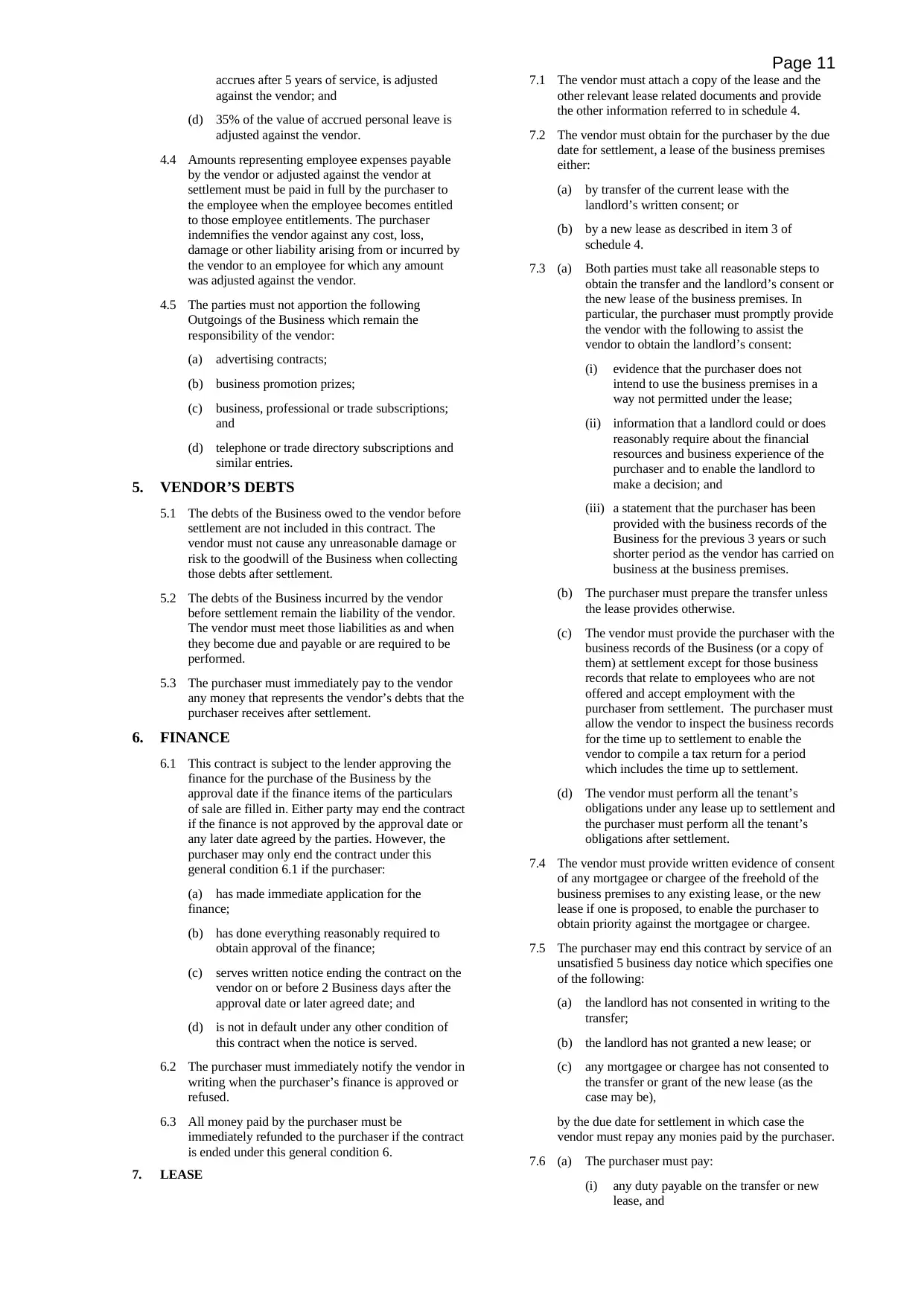
Page 11
accrues after 5 years of service, is adjusted
against the vendor; and
(d) 35% of the value of accrued personal leave is
adjusted against the vendor.
4.4 Amounts representing employee expenses payable
by the vendor or adjusted against the vendor at
settlement must be paid in full by the purchaser to
the employee when the employee becomes entitled
to those employee entitlements. The purchaser
indemnifies the vendor against any cost, loss,
damage or other liability arising from or incurred by
the vendor to an employee for which any amount
was adjusted against the vendor.
4.5 The parties must not apportion the following
Outgoings of the Business which remain the
responsibility of the vendor:
(a) advertising contracts;
(b) business promotion prizes;
(c) business, professional or trade subscriptions;
and
(d) telephone or trade directory subscriptions and
similar entries.
5. VENDOR’S DEBTS
5.1 The debts of the Business owed to the vendor before
settlement are not included in this contract. The
vendor must not cause any unreasonable damage or
risk to the goodwill of the Business when collecting
those debts after settlement.
5.2 The debts of the Business incurred by the vendor
before settlement remain the liability of the vendor.
The vendor must meet those liabilities as and when
they become due and payable or are required to be
performed.
5.3 The purchaser must immediately pay to the vendor
any money that represents the vendor’s debts that the
purchaser receives after settlement.
6. FINANCE
6.1 This contract is subject to the lender approving the
finance for the purchase of the Business by the
approval date if the finance items of the particulars
of sale are filled in. Either party may end the contract
if the finance is not approved by the approval date or
any later date agreed by the parties. However, the
purchaser may only end the contract under this
general condition 6.1 if the purchaser:
(a) has made immediate application for the
finance;
(b) has done everything reasonably required to
obtain approval of the finance;
(c) serves written notice ending the contract on the
vendor on or before 2 Business days after the
approval date or later agreed date; and
(d) is not in default under any other condition of
this contract when the notice is served.
6.2 The purchaser must immediately notify the vendor in
writing when the purchaser’s finance is approved or
refused.
6.3 All money paid by the purchaser must be
immediately refunded to the purchaser if the contract
is ended under this general condition 6.
7. LEASE
7.1 The vendor must attach a copy of the lease and the
other relevant lease related documents and provide
the other information referred to in schedule 4.
7.2 The vendor must obtain for the purchaser by the due
date for settlement, a lease of the business premises
either:
(a) by transfer of the current lease with the
landlord’s written consent; or
(b) by a new lease as described in item 3 of
schedule 4.
7.3 (a) Both parties must take all reasonable steps to
obtain the transfer and the landlord’s consent or
the new lease of the business premises. In
particular, the purchaser must promptly provide
the vendor with the following to assist the
vendor to obtain the landlord’s consent:
(i) evidence that the purchaser does not
intend to use the business premises in a
way not permitted under the lease;
(ii) information that a landlord could or does
reasonably require about the financial
resources and business experience of the
purchaser and to enable the landlord to
make a decision; and
(iii) a statement that the purchaser has been
provided with the business records of the
Business for the previous 3 years or such
shorter period as the vendor has carried on
business at the business premises.
(b) The purchaser must prepare the transfer unless
the lease provides otherwise.
(c) The vendor must provide the purchaser with the
business records of the Business (or a copy of
them) at settlement except for those business
records that relate to employees who are not
offered and accept employment with the
purchaser from settlement. The purchaser must
allow the vendor to inspect the business records
for the time up to settlement to enable the
vendor to compile a tax return for a period
which includes the time up to settlement.
(d) The vendor must perform all the tenant’s
obligations under any lease up to settlement and
the purchaser must perform all the tenant’s
obligations after settlement.
7.4 The vendor must provide written evidence of consent
of any mortgagee or chargee of the freehold of the
business premises to any existing lease, or the new
lease if one is proposed, to enable the purchaser to
obtain priority against the mortgagee or chargee.
7.5 The purchaser may end this contract by service of an
unsatisfied 5 business day notice which specifies one
of the following:
(a) the landlord has not consented in writing to the
transfer;
(b) the landlord has not granted a new lease; or
(c) any mortgagee or chargee has not consented to
the transfer or grant of the new lease (as the
case may be),
by the due date for settlement in which case the
vendor must repay any monies paid by the purchaser.
7.6 (a) The purchaser must pay:
(i) any duty payable on the transfer or new
lease, and
accrues after 5 years of service, is adjusted
against the vendor; and
(d) 35% of the value of accrued personal leave is
adjusted against the vendor.
4.4 Amounts representing employee expenses payable
by the vendor or adjusted against the vendor at
settlement must be paid in full by the purchaser to
the employee when the employee becomes entitled
to those employee entitlements. The purchaser
indemnifies the vendor against any cost, loss,
damage or other liability arising from or incurred by
the vendor to an employee for which any amount
was adjusted against the vendor.
4.5 The parties must not apportion the following
Outgoings of the Business which remain the
responsibility of the vendor:
(a) advertising contracts;
(b) business promotion prizes;
(c) business, professional or trade subscriptions;
and
(d) telephone or trade directory subscriptions and
similar entries.
5. VENDOR’S DEBTS
5.1 The debts of the Business owed to the vendor before
settlement are not included in this contract. The
vendor must not cause any unreasonable damage or
risk to the goodwill of the Business when collecting
those debts after settlement.
5.2 The debts of the Business incurred by the vendor
before settlement remain the liability of the vendor.
The vendor must meet those liabilities as and when
they become due and payable or are required to be
performed.
5.3 The purchaser must immediately pay to the vendor
any money that represents the vendor’s debts that the
purchaser receives after settlement.
6. FINANCE
6.1 This contract is subject to the lender approving the
finance for the purchase of the Business by the
approval date if the finance items of the particulars
of sale are filled in. Either party may end the contract
if the finance is not approved by the approval date or
any later date agreed by the parties. However, the
purchaser may only end the contract under this
general condition 6.1 if the purchaser:
(a) has made immediate application for the
finance;
(b) has done everything reasonably required to
obtain approval of the finance;
(c) serves written notice ending the contract on the
vendor on or before 2 Business days after the
approval date or later agreed date; and
(d) is not in default under any other condition of
this contract when the notice is served.
6.2 The purchaser must immediately notify the vendor in
writing when the purchaser’s finance is approved or
refused.
6.3 All money paid by the purchaser must be
immediately refunded to the purchaser if the contract
is ended under this general condition 6.
7. LEASE
7.1 The vendor must attach a copy of the lease and the
other relevant lease related documents and provide
the other information referred to in schedule 4.
7.2 The vendor must obtain for the purchaser by the due
date for settlement, a lease of the business premises
either:
(a) by transfer of the current lease with the
landlord’s written consent; or
(b) by a new lease as described in item 3 of
schedule 4.
7.3 (a) Both parties must take all reasonable steps to
obtain the transfer and the landlord’s consent or
the new lease of the business premises. In
particular, the purchaser must promptly provide
the vendor with the following to assist the
vendor to obtain the landlord’s consent:
(i) evidence that the purchaser does not
intend to use the business premises in a
way not permitted under the lease;
(ii) information that a landlord could or does
reasonably require about the financial
resources and business experience of the
purchaser and to enable the landlord to
make a decision; and
(iii) a statement that the purchaser has been
provided with the business records of the
Business for the previous 3 years or such
shorter period as the vendor has carried on
business at the business premises.
(b) The purchaser must prepare the transfer unless
the lease provides otherwise.
(c) The vendor must provide the purchaser with the
business records of the Business (or a copy of
them) at settlement except for those business
records that relate to employees who are not
offered and accept employment with the
purchaser from settlement. The purchaser must
allow the vendor to inspect the business records
for the time up to settlement to enable the
vendor to compile a tax return for a period
which includes the time up to settlement.
(d) The vendor must perform all the tenant’s
obligations under any lease up to settlement and
the purchaser must perform all the tenant’s
obligations after settlement.
7.4 The vendor must provide written evidence of consent
of any mortgagee or chargee of the freehold of the
business premises to any existing lease, or the new
lease if one is proposed, to enable the purchaser to
obtain priority against the mortgagee or chargee.
7.5 The purchaser may end this contract by service of an
unsatisfied 5 business day notice which specifies one
of the following:
(a) the landlord has not consented in writing to the
transfer;
(b) the landlord has not granted a new lease; or
(c) any mortgagee or chargee has not consented to
the transfer or grant of the new lease (as the
case may be),
by the due date for settlement in which case the
vendor must repay any monies paid by the purchaser.
7.6 (a) The purchaser must pay:
(i) any duty payable on the transfer or new
lease, and
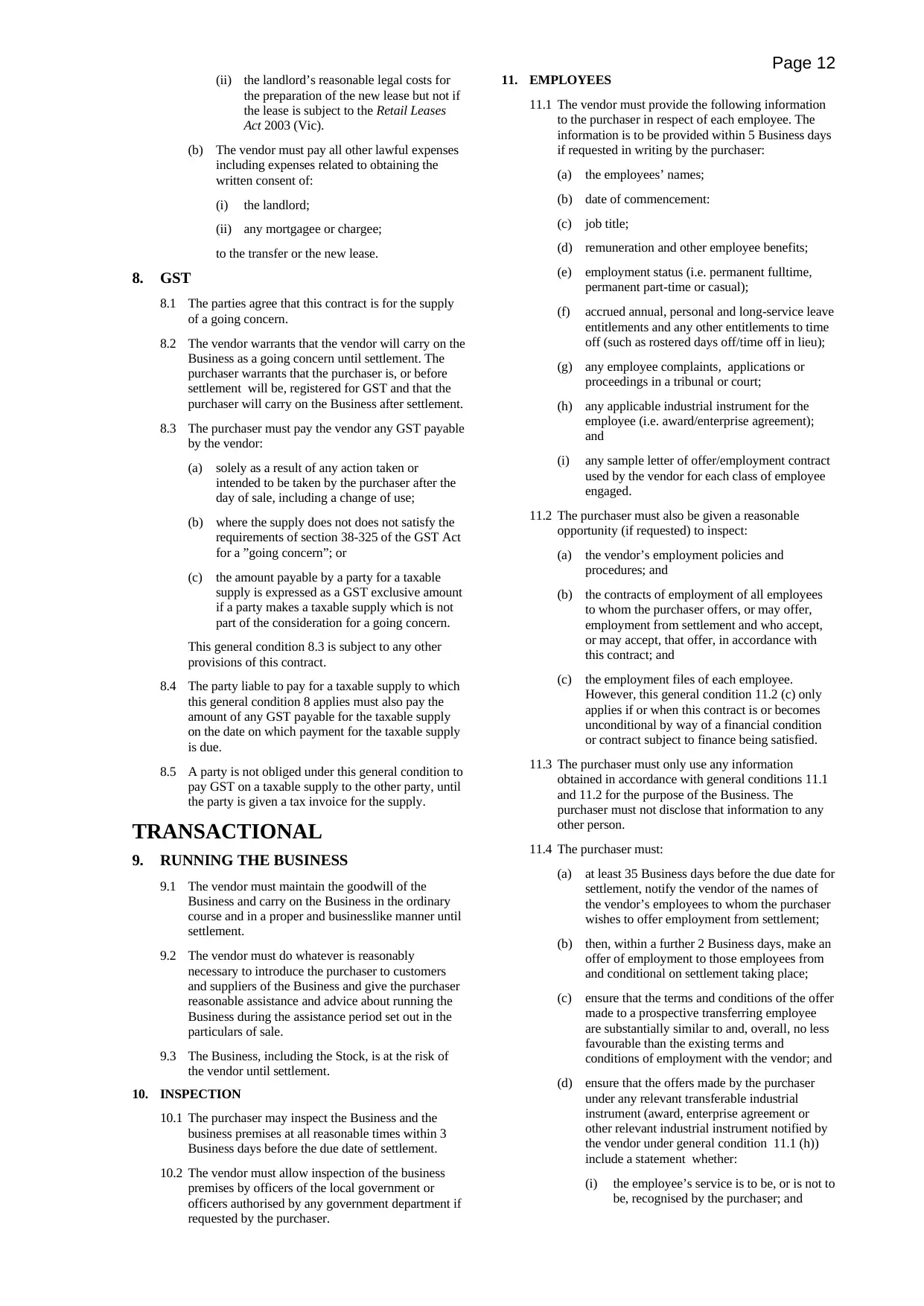
Page 12
(ii) the landlord’s reasonable legal costs for
the preparation of the new lease but not if
the lease is subject to the Retail Leases
Act 2003 (Vic).
(b) The vendor must pay all other lawful expenses
including expenses related to obtaining the
written consent of:
(i) the landlord;
(ii) any mortgagee or chargee;
to the transfer or the new lease.
8. GST
8.1 The parties agree that this contract is for the supply
of a going concern.
8.2 The vendor warrants that the vendor will carry on the
Business as a going concern until settlement. The
purchaser warrants that the purchaser is, or before
settlement will be, registered for GST and that the
purchaser will carry on the Business after settlement.
8.3 The purchaser must pay the vendor any GST payable
by the vendor:
(a) solely as a result of any action taken or
intended to be taken by the purchaser after the
day of sale, including a change of use;
(b) where the supply does not does not satisfy the
requirements of section 38-325 of the GST Act
for a ”going concern”; or
(c) the amount payable by a party for a taxable
supply is expressed as a GST exclusive amount
if a party makes a taxable supply which is not
part of the consideration for a going concern.
This general condition 8.3 is subject to any other
provisions of this contract.
8.4 The party liable to pay for a taxable supply to which
this general condition 8 applies must also pay the
amount of any GST payable for the taxable supply
on the date on which payment for the taxable supply
is due.
8.5 A party is not obliged under this general condition to
pay GST on a taxable supply to the other party, until
the party is given a tax invoice for the supply.
TRANSACTIONAL
9. RUNNING THE BUSINESS
9.1 The vendor must maintain the goodwill of the
Business and carry on the Business in the ordinary
course and in a proper and businesslike manner until
settlement.
9.2 The vendor must do whatever is reasonably
necessary to introduce the purchaser to customers
and suppliers of the Business and give the purchaser
reasonable assistance and advice about running the
Business during the assistance period set out in the
particulars of sale.
9.3 The Business, including the Stock, is at the risk of
the vendor until settlement.
10. INSPECTION
10.1 The purchaser may inspect the Business and the
business premises at all reasonable times within 3
Business days before the due date of settlement.
10.2 The vendor must allow inspection of the business
premises by officers of the local government or
officers authorised by any government department if
requested by the purchaser.
11. EMPLOYEES
11.1 The vendor must provide the following information
to the purchaser in respect of each employee. The
information is to be provided within 5 Business days
if requested in writing by the purchaser:
(a) the employees’ names;
(b) date of commencement:
(c) job title;
(d) remuneration and other employee benefits;
(e) employment status (i.e. permanent fulltime,
permanent part-time or casual);
(f) accrued annual, personal and long-service leave
entitlements and any other entitlements to time
off (such as rostered days off/time off in lieu);
(g) any employee complaints, applications or
proceedings in a tribunal or court;
(h) any applicable industrial instrument for the
employee (i.e. award/enterprise agreement);
and
(i) any sample letter of offer/employment contract
used by the vendor for each class of employee
engaged.
11.2 The purchaser must also be given a reasonable
opportunity (if requested) to inspect:
(a) the vendor’s employment policies and
procedures; and
(b) the contracts of employment of all employees
to whom the purchaser offers, or may offer,
employment from settlement and who accept,
or may accept, that offer, in accordance with
this contract; and
(c) the employment files of each employee.
However, this general condition 11.2 (c) only
applies if or when this contract is or becomes
unconditional by way of a financial condition
or contract subject to finance being satisfied.
11.3 The purchaser must only use any information
obtained in accordance with general conditions 11.1
and 11.2 for the purpose of the Business. The
purchaser must not disclose that information to any
other person.
11.4 The purchaser must:
(a) at least 35 Business days before the due date for
settlement, notify the vendor of the names of
the vendor’s employees to whom the purchaser
wishes to offer employment from settlement;
(b) then, within a further 2 Business days, make an
offer of employment to those employees from
and conditional on settlement taking place;
(c) ensure that the terms and conditions of the offer
made to a prospective transferring employee
are substantially similar to and, overall, no less
favourable than the existing terms and
conditions of employment with the vendor; and
(d) ensure that the offers made by the purchaser
under any relevant transferable industrial
instrument (award, enterprise agreement or
other relevant industrial instrument notified by
the vendor under general condition 11.1 (h))
include a statement whether:
(i) the employee’s service is to be, or is not to
be, recognised by the purchaser; and
(ii) the landlord’s reasonable legal costs for
the preparation of the new lease but not if
the lease is subject to the Retail Leases
Act 2003 (Vic).
(b) The vendor must pay all other lawful expenses
including expenses related to obtaining the
written consent of:
(i) the landlord;
(ii) any mortgagee or chargee;
to the transfer or the new lease.
8. GST
8.1 The parties agree that this contract is for the supply
of a going concern.
8.2 The vendor warrants that the vendor will carry on the
Business as a going concern until settlement. The
purchaser warrants that the purchaser is, or before
settlement will be, registered for GST and that the
purchaser will carry on the Business after settlement.
8.3 The purchaser must pay the vendor any GST payable
by the vendor:
(a) solely as a result of any action taken or
intended to be taken by the purchaser after the
day of sale, including a change of use;
(b) where the supply does not does not satisfy the
requirements of section 38-325 of the GST Act
for a ”going concern”; or
(c) the amount payable by a party for a taxable
supply is expressed as a GST exclusive amount
if a party makes a taxable supply which is not
part of the consideration for a going concern.
This general condition 8.3 is subject to any other
provisions of this contract.
8.4 The party liable to pay for a taxable supply to which
this general condition 8 applies must also pay the
amount of any GST payable for the taxable supply
on the date on which payment for the taxable supply
is due.
8.5 A party is not obliged under this general condition to
pay GST on a taxable supply to the other party, until
the party is given a tax invoice for the supply.
TRANSACTIONAL
9. RUNNING THE BUSINESS
9.1 The vendor must maintain the goodwill of the
Business and carry on the Business in the ordinary
course and in a proper and businesslike manner until
settlement.
9.2 The vendor must do whatever is reasonably
necessary to introduce the purchaser to customers
and suppliers of the Business and give the purchaser
reasonable assistance and advice about running the
Business during the assistance period set out in the
particulars of sale.
9.3 The Business, including the Stock, is at the risk of
the vendor until settlement.
10. INSPECTION
10.1 The purchaser may inspect the Business and the
business premises at all reasonable times within 3
Business days before the due date of settlement.
10.2 The vendor must allow inspection of the business
premises by officers of the local government or
officers authorised by any government department if
requested by the purchaser.
11. EMPLOYEES
11.1 The vendor must provide the following information
to the purchaser in respect of each employee. The
information is to be provided within 5 Business days
if requested in writing by the purchaser:
(a) the employees’ names;
(b) date of commencement:
(c) job title;
(d) remuneration and other employee benefits;
(e) employment status (i.e. permanent fulltime,
permanent part-time or casual);
(f) accrued annual, personal and long-service leave
entitlements and any other entitlements to time
off (such as rostered days off/time off in lieu);
(g) any employee complaints, applications or
proceedings in a tribunal or court;
(h) any applicable industrial instrument for the
employee (i.e. award/enterprise agreement);
and
(i) any sample letter of offer/employment contract
used by the vendor for each class of employee
engaged.
11.2 The purchaser must also be given a reasonable
opportunity (if requested) to inspect:
(a) the vendor’s employment policies and
procedures; and
(b) the contracts of employment of all employees
to whom the purchaser offers, or may offer,
employment from settlement and who accept,
or may accept, that offer, in accordance with
this contract; and
(c) the employment files of each employee.
However, this general condition 11.2 (c) only
applies if or when this contract is or becomes
unconditional by way of a financial condition
or contract subject to finance being satisfied.
11.3 The purchaser must only use any information
obtained in accordance with general conditions 11.1
and 11.2 for the purpose of the Business. The
purchaser must not disclose that information to any
other person.
11.4 The purchaser must:
(a) at least 35 Business days before the due date for
settlement, notify the vendor of the names of
the vendor’s employees to whom the purchaser
wishes to offer employment from settlement;
(b) then, within a further 2 Business days, make an
offer of employment to those employees from
and conditional on settlement taking place;
(c) ensure that the terms and conditions of the offer
made to a prospective transferring employee
are substantially similar to and, overall, no less
favourable than the existing terms and
conditions of employment with the vendor; and
(d) ensure that the offers made by the purchaser
under any relevant transferable industrial
instrument (award, enterprise agreement or
other relevant industrial instrument notified by
the vendor under general condition 11.1 (h))
include a statement whether:
(i) the employee’s service is to be, or is not to
be, recognised by the purchaser; and
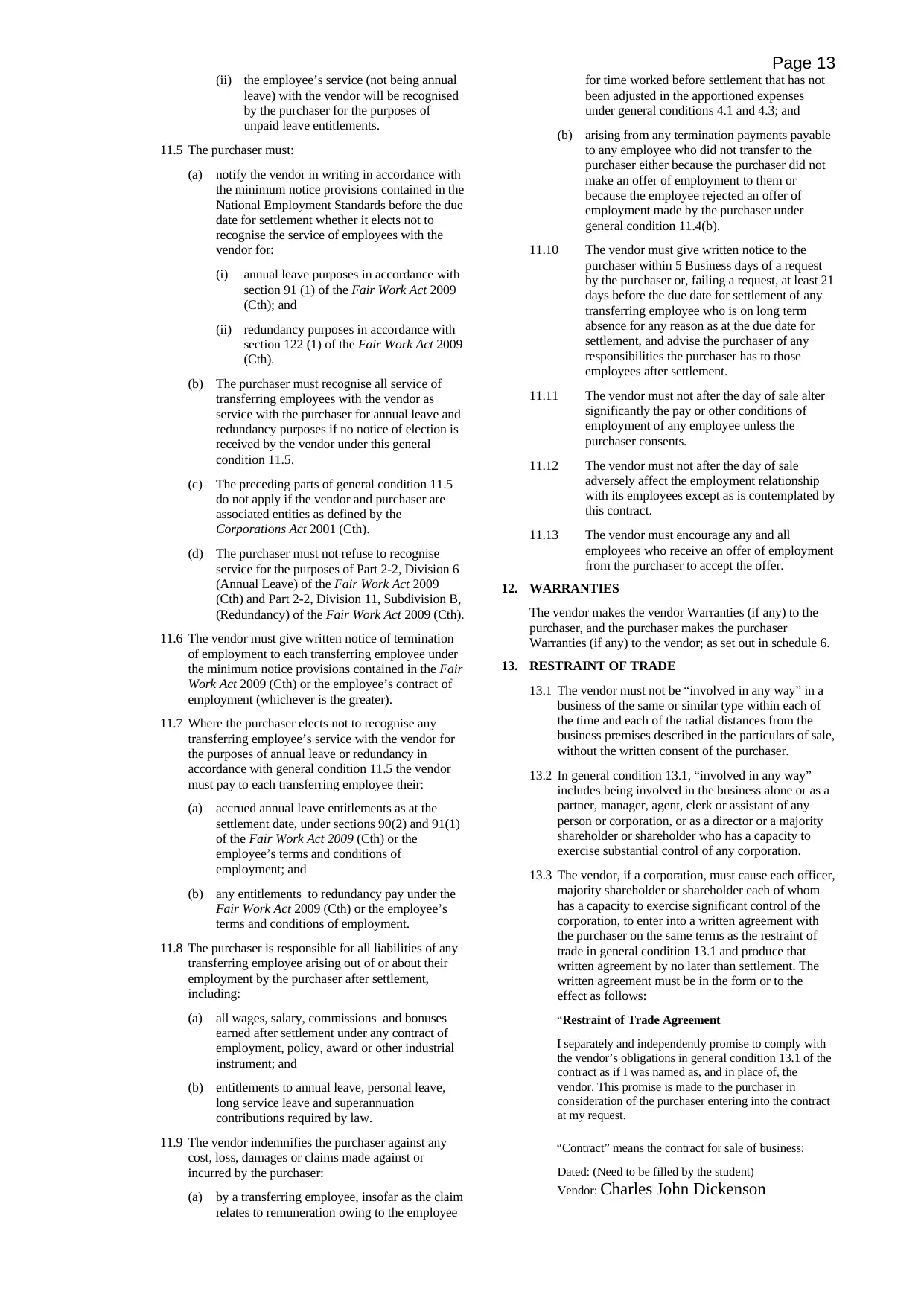
Page 13
(ii) the employee’s service (not being annual
leave) with the vendor will be recognised
by the purchaser for the purposes of
unpaid leave entitlements.
11.5 The purchaser must:
(a) notify the vendor in writing in accordance with
the minimum notice provisions contained in the
National Employment Standards before the due
date for settlement whether it elects not to
recognise the service of employees with the
vendor for:
(i) annual leave purposes in accordance with
section 91 (1) of the Fair Work Act 2009
(Cth); and
(ii) redundancy purposes in accordance with
section 122 (1) of the Fair Work Act 2009
(Cth).
(b) The purchaser must recognise all service of
transferring employees with the vendor as
service with the purchaser for annual leave and
redundancy purposes if no notice of election is
received by the vendor under this general
condition 11.5.
(c) The preceding parts of general condition 11.5
do not apply if the vendor and purchaser are
associated entities as defined by the
Corporations Act 2001 (Cth).
(d) The purchaser must not refuse to recognise
service for the purposes of Part 2-2, Division 6
(Annual Leave) of the Fair Work Act 2009
(Cth) and Part 2-2, Division 11, Subdivision B,
(Redundancy) of the Fair Work Act 2009 (Cth).
11.6 The vendor must give written notice of termination
of employment to each transferring employee under
the minimum notice provisions contained in the Fair
Work Act 2009 (Cth) or the employee’s contract of
employment (whichever is the greater).
11.7 Where the purchaser elects not to recognise any
transferring employee’s service with the vendor for
the purposes of annual leave or redundancy in
accordance with general condition 11.5 the vendor
must pay to each transferring employee their:
(a) accrued annual leave entitlements as at the
settlement date, under sections 90(2) and 91(1)
of the Fair Work Act 2009 (Cth) or the
employee’s terms and conditions of
employment; and
(b) any entitlements to redundancy pay under the
Fair Work Act 2009 (Cth) or the employee’s
terms and conditions of employment.
11.8 The purchaser is responsible for all liabilities of any
transferring employee arising out of or about their
employment by the purchaser after settlement,
including:
(a) all wages, salary, commissions and bonuses
earned after settlement under any contract of
employment, policy, award or other industrial
instrument; and
(b) entitlements to annual leave, personal leave,
long service leave and superannuation
contributions required by law.
11.9 The vendor indemnifies the purchaser against any
cost, loss, damages or claims made against or
incurred by the purchaser:
(a) by a transferring employee, insofar as the claim
relates to remuneration owing to the employee
for time worked before settlement that has not
been adjusted in the apportioned expenses
under general conditions 4.1 and 4.3; and
(b) arising from any termination payments payable
to any employee who did not transfer to the
purchaser either because the purchaser did not
make an offer of employment to them or
because the employee rejected an offer of
employment made by the purchaser under
general condition 11.4(b).
11.10 The vendor must give written notice to the
purchaser within 5 Business days of a request
by the purchaser or, failing a request, at least 21
days before the due date for settlement of any
transferring employee who is on long term
absence for any reason as at the due date for
settlement, and advise the purchaser of any
responsibilities the purchaser has to those
employees after settlement.
11.11 The vendor must not after the day of sale alter
significantly the pay or other conditions of
employment of any employee unless the
purchaser consents.
11.12 The vendor must not after the day of sale
adversely affect the employment relationship
with its employees except as is contemplated by
this contract.
11.13 The vendor must encourage any and all
employees who receive an offer of employment
from the purchaser to accept the offer.
12. WARRANTIES
The vendor makes the vendor Warranties (if any) to the
purchaser, and the purchaser makes the purchaser
Warranties (if any) to the vendor; as set out in schedule 6.
13. RESTRAINT OF TRADE
13.1 The vendor must not be “involved in any way” in a
business of the same or similar type within each of
the time and each of the radial distances from the
business premises described in the particulars of sale,
without the written consent of the purchaser.
13.2 In general condition 13.1, “involved in any way”
includes being involved in the business alone or as a
partner, manager, agent, clerk or assistant of any
person or corporation, or as a director or a majority
shareholder or shareholder who has a capacity to
exercise substantial control of any corporation.
13.3 The vendor, if a corporation, must cause each officer,
majority shareholder or shareholder each of whom
has a capacity to exercise significant control of the
corporation, to enter into a written agreement with
the purchaser on the same terms as the restraint of
trade in general condition 13.1 and produce that
written agreement by no later than settlement. The
written agreement must be in the form or to the
effect as follows:
“Restraint of Trade Agreement
I separately and independently promise to comply with
the vendor’s obligations in general condition 13.1 of the
contract as if I was named as, and in place of, the
vendor. This promise is made to the purchaser in
consideration of the purchaser entering into the contract
at my request.
“Contract” means the contract for sale of business:
Dated: (Need to be filled by the student)
Vendor: Charles John Dickenson
(ii) the employee’s service (not being annual
leave) with the vendor will be recognised
by the purchaser for the purposes of
unpaid leave entitlements.
11.5 The purchaser must:
(a) notify the vendor in writing in accordance with
the minimum notice provisions contained in the
National Employment Standards before the due
date for settlement whether it elects not to
recognise the service of employees with the
vendor for:
(i) annual leave purposes in accordance with
section 91 (1) of the Fair Work Act 2009
(Cth); and
(ii) redundancy purposes in accordance with
section 122 (1) of the Fair Work Act 2009
(Cth).
(b) The purchaser must recognise all service of
transferring employees with the vendor as
service with the purchaser for annual leave and
redundancy purposes if no notice of election is
received by the vendor under this general
condition 11.5.
(c) The preceding parts of general condition 11.5
do not apply if the vendor and purchaser are
associated entities as defined by the
Corporations Act 2001 (Cth).
(d) The purchaser must not refuse to recognise
service for the purposes of Part 2-2, Division 6
(Annual Leave) of the Fair Work Act 2009
(Cth) and Part 2-2, Division 11, Subdivision B,
(Redundancy) of the Fair Work Act 2009 (Cth).
11.6 The vendor must give written notice of termination
of employment to each transferring employee under
the minimum notice provisions contained in the Fair
Work Act 2009 (Cth) or the employee’s contract of
employment (whichever is the greater).
11.7 Where the purchaser elects not to recognise any
transferring employee’s service with the vendor for
the purposes of annual leave or redundancy in
accordance with general condition 11.5 the vendor
must pay to each transferring employee their:
(a) accrued annual leave entitlements as at the
settlement date, under sections 90(2) and 91(1)
of the Fair Work Act 2009 (Cth) or the
employee’s terms and conditions of
employment; and
(b) any entitlements to redundancy pay under the
Fair Work Act 2009 (Cth) or the employee’s
terms and conditions of employment.
11.8 The purchaser is responsible for all liabilities of any
transferring employee arising out of or about their
employment by the purchaser after settlement,
including:
(a) all wages, salary, commissions and bonuses
earned after settlement under any contract of
employment, policy, award or other industrial
instrument; and
(b) entitlements to annual leave, personal leave,
long service leave and superannuation
contributions required by law.
11.9 The vendor indemnifies the purchaser against any
cost, loss, damages or claims made against or
incurred by the purchaser:
(a) by a transferring employee, insofar as the claim
relates to remuneration owing to the employee
for time worked before settlement that has not
been adjusted in the apportioned expenses
under general conditions 4.1 and 4.3; and
(b) arising from any termination payments payable
to any employee who did not transfer to the
purchaser either because the purchaser did not
make an offer of employment to them or
because the employee rejected an offer of
employment made by the purchaser under
general condition 11.4(b).
11.10 The vendor must give written notice to the
purchaser within 5 Business days of a request
by the purchaser or, failing a request, at least 21
days before the due date for settlement of any
transferring employee who is on long term
absence for any reason as at the due date for
settlement, and advise the purchaser of any
responsibilities the purchaser has to those
employees after settlement.
11.11 The vendor must not after the day of sale alter
significantly the pay or other conditions of
employment of any employee unless the
purchaser consents.
11.12 The vendor must not after the day of sale
adversely affect the employment relationship
with its employees except as is contemplated by
this contract.
11.13 The vendor must encourage any and all
employees who receive an offer of employment
from the purchaser to accept the offer.
12. WARRANTIES
The vendor makes the vendor Warranties (if any) to the
purchaser, and the purchaser makes the purchaser
Warranties (if any) to the vendor; as set out in schedule 6.
13. RESTRAINT OF TRADE
13.1 The vendor must not be “involved in any way” in a
business of the same or similar type within each of
the time and each of the radial distances from the
business premises described in the particulars of sale,
without the written consent of the purchaser.
13.2 In general condition 13.1, “involved in any way”
includes being involved in the business alone or as a
partner, manager, agent, clerk or assistant of any
person or corporation, or as a director or a majority
shareholder or shareholder who has a capacity to
exercise substantial control of any corporation.
13.3 The vendor, if a corporation, must cause each officer,
majority shareholder or shareholder each of whom
has a capacity to exercise significant control of the
corporation, to enter into a written agreement with
the purchaser on the same terms as the restraint of
trade in general condition 13.1 and produce that
written agreement by no later than settlement. The
written agreement must be in the form or to the
effect as follows:
“Restraint of Trade Agreement
I separately and independently promise to comply with
the vendor’s obligations in general condition 13.1 of the
contract as if I was named as, and in place of, the
vendor. This promise is made to the purchaser in
consideration of the purchaser entering into the contract
at my request.
“Contract” means the contract for sale of business:
Dated: (Need to be filled by the student)
Vendor: Charles John Dickenson
Paraphrase This Document
Need a fresh take? Get an instant paraphrase of this document with our AI Paraphraser
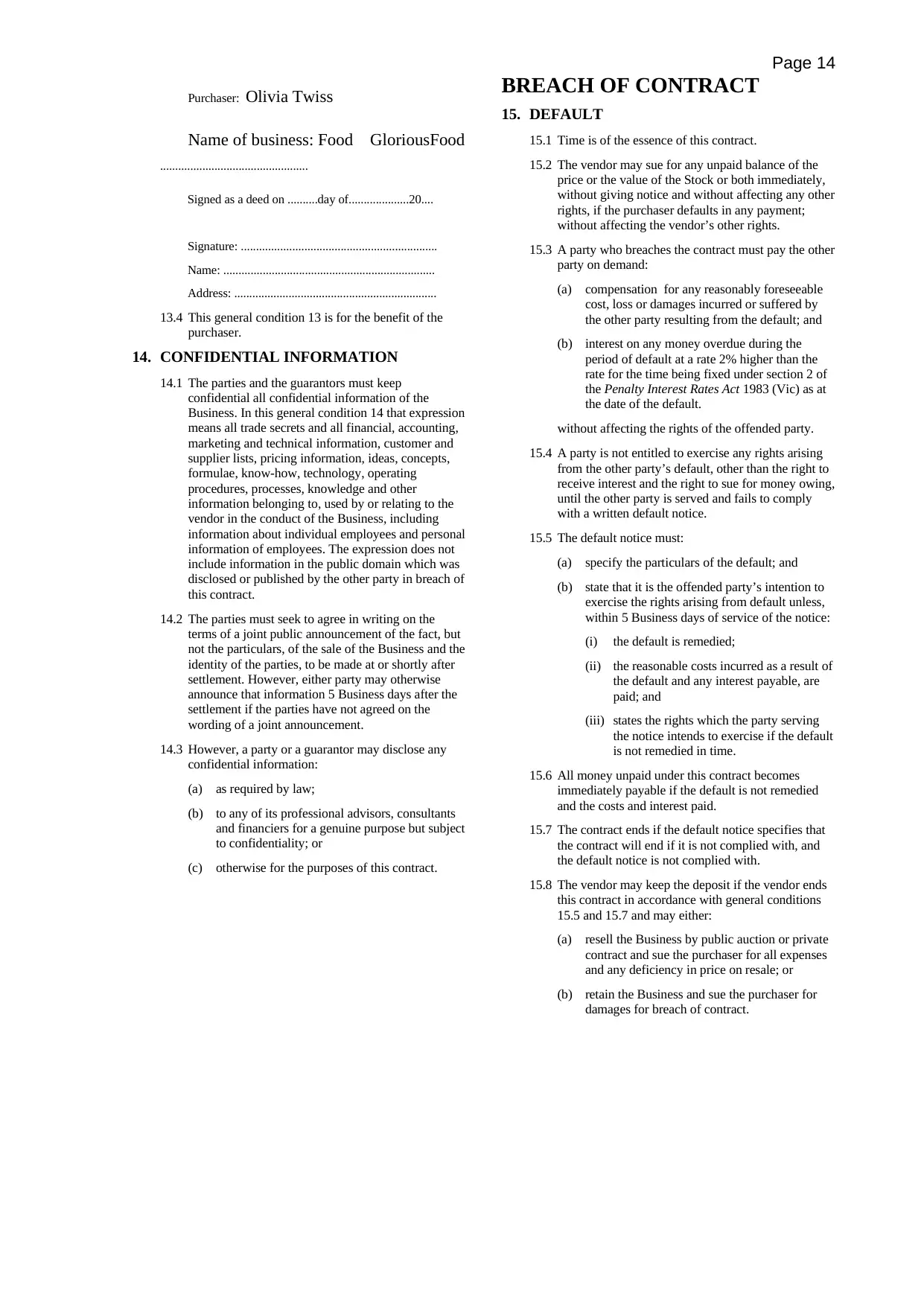
Page 14
Purchaser: Olivia Twiss
Name of business: Food GloriousFood
.................................................
Signed as a deed on ..........day of....................20....
Signature: .................................................................
Name: ......................................................................
Address: ...................................................................
13.4 This general condition 13 is for the benefit of the
purchaser.
14. CONFIDENTIAL INFORMATION
14.1 The parties and the guarantors must keep
confidential all confidential information of the
Business. In this general condition 14 that expression
means all trade secrets and all financial, accounting,
marketing and technical information, customer and
supplier lists, pricing information, ideas, concepts,
formulae, know-how, technology, operating
procedures, processes, knowledge and other
information belonging to, used by or relating to the
vendor in the conduct of the Business, including
information about individual employees and personal
information of employees. The expression does not
include information in the public domain which was
disclosed or published by the other party in breach of
this contract.
14.2 The parties must seek to agree in writing on the
terms of a joint public announcement of the fact, but
not the particulars, of the sale of the Business and the
identity of the parties, to be made at or shortly after
settlement. However, either party may otherwise
announce that information 5 Business days after the
settlement if the parties have not agreed on the
wording of a joint announcement.
14.3 However, a party or a guarantor may disclose any
confidential information:
(a) as required by law;
(b) to any of its professional advisors, consultants
and financiers for a genuine purpose but subject
to confidentiality; or
(c) otherwise for the purposes of this contract.
BREACH OF CONTRACT
15. DEFAULT
15.1 Time is of the essence of this contract.
15.2 The vendor may sue for any unpaid balance of the
price or the value of the Stock or both immediately,
without giving notice and without affecting any other
rights, if the purchaser defaults in any payment;
without affecting the vendor’s other rights.
15.3 A party who breaches the contract must pay the other
party on demand:
(a) compensation for any reasonably foreseeable
cost, loss or damages incurred or suffered by
the other party resulting from the default; and
(b) interest on any money overdue during the
period of default at a rate 2% higher than the
rate for the time being fixed under section 2 of
the Penalty Interest Rates Act 1983 (Vic) as at
the date of the default.
without affecting the rights of the offended party.
15.4 A party is not entitled to exercise any rights arising
from the other party’s default, other than the right to
receive interest and the right to sue for money owing,
until the other party is served and fails to comply
with a written default notice.
15.5 The default notice must:
(a) specify the particulars of the default; and
(b) state that it is the offended party’s intention to
exercise the rights arising from default unless,
within 5 Business days of service of the notice:
(i) the default is remedied;
(ii) the reasonable costs incurred as a result of
the default and any interest payable, are
paid; and
(iii) states the rights which the party serving
the notice intends to exercise if the default
is not remedied in time.
15.6 All money unpaid under this contract becomes
immediately payable if the default is not remedied
and the costs and interest paid.
15.7 The contract ends if the default notice specifies that
the contract will end if it is not complied with, and
the default notice is not complied with.
15.8 The vendor may keep the deposit if the vendor ends
this contract in accordance with general conditions
15.5 and 15.7 and may either:
(a) resell the Business by public auction or private
contract and sue the purchaser for all expenses
and any deficiency in price on resale; or
(b) retain the Business and sue the purchaser for
damages for breach of contract.
Purchaser: Olivia Twiss
Name of business: Food GloriousFood
.................................................
Signed as a deed on ..........day of....................20....
Signature: .................................................................
Name: ......................................................................
Address: ...................................................................
13.4 This general condition 13 is for the benefit of the
purchaser.
14. CONFIDENTIAL INFORMATION
14.1 The parties and the guarantors must keep
confidential all confidential information of the
Business. In this general condition 14 that expression
means all trade secrets and all financial, accounting,
marketing and technical information, customer and
supplier lists, pricing information, ideas, concepts,
formulae, know-how, technology, operating
procedures, processes, knowledge and other
information belonging to, used by or relating to the
vendor in the conduct of the Business, including
information about individual employees and personal
information of employees. The expression does not
include information in the public domain which was
disclosed or published by the other party in breach of
this contract.
14.2 The parties must seek to agree in writing on the
terms of a joint public announcement of the fact, but
not the particulars, of the sale of the Business and the
identity of the parties, to be made at or shortly after
settlement. However, either party may otherwise
announce that information 5 Business days after the
settlement if the parties have not agreed on the
wording of a joint announcement.
14.3 However, a party or a guarantor may disclose any
confidential information:
(a) as required by law;
(b) to any of its professional advisors, consultants
and financiers for a genuine purpose but subject
to confidentiality; or
(c) otherwise for the purposes of this contract.
BREACH OF CONTRACT
15. DEFAULT
15.1 Time is of the essence of this contract.
15.2 The vendor may sue for any unpaid balance of the
price or the value of the Stock or both immediately,
without giving notice and without affecting any other
rights, if the purchaser defaults in any payment;
without affecting the vendor’s other rights.
15.3 A party who breaches the contract must pay the other
party on demand:
(a) compensation for any reasonably foreseeable
cost, loss or damages incurred or suffered by
the other party resulting from the default; and
(b) interest on any money overdue during the
period of default at a rate 2% higher than the
rate for the time being fixed under section 2 of
the Penalty Interest Rates Act 1983 (Vic) as at
the date of the default.
without affecting the rights of the offended party.
15.4 A party is not entitled to exercise any rights arising
from the other party’s default, other than the right to
receive interest and the right to sue for money owing,
until the other party is served and fails to comply
with a written default notice.
15.5 The default notice must:
(a) specify the particulars of the default; and
(b) state that it is the offended party’s intention to
exercise the rights arising from default unless,
within 5 Business days of service of the notice:
(i) the default is remedied;
(ii) the reasonable costs incurred as a result of
the default and any interest payable, are
paid; and
(iii) states the rights which the party serving
the notice intends to exercise if the default
is not remedied in time.
15.6 All money unpaid under this contract becomes
immediately payable if the default is not remedied
and the costs and interest paid.
15.7 The contract ends if the default notice specifies that
the contract will end if it is not complied with, and
the default notice is not complied with.
15.8 The vendor may keep the deposit if the vendor ends
this contract in accordance with general conditions
15.5 and 15.7 and may either:
(a) resell the Business by public auction or private
contract and sue the purchaser for all expenses
and any deficiency in price on resale; or
(b) retain the Business and sue the purchaser for
damages for breach of contract.
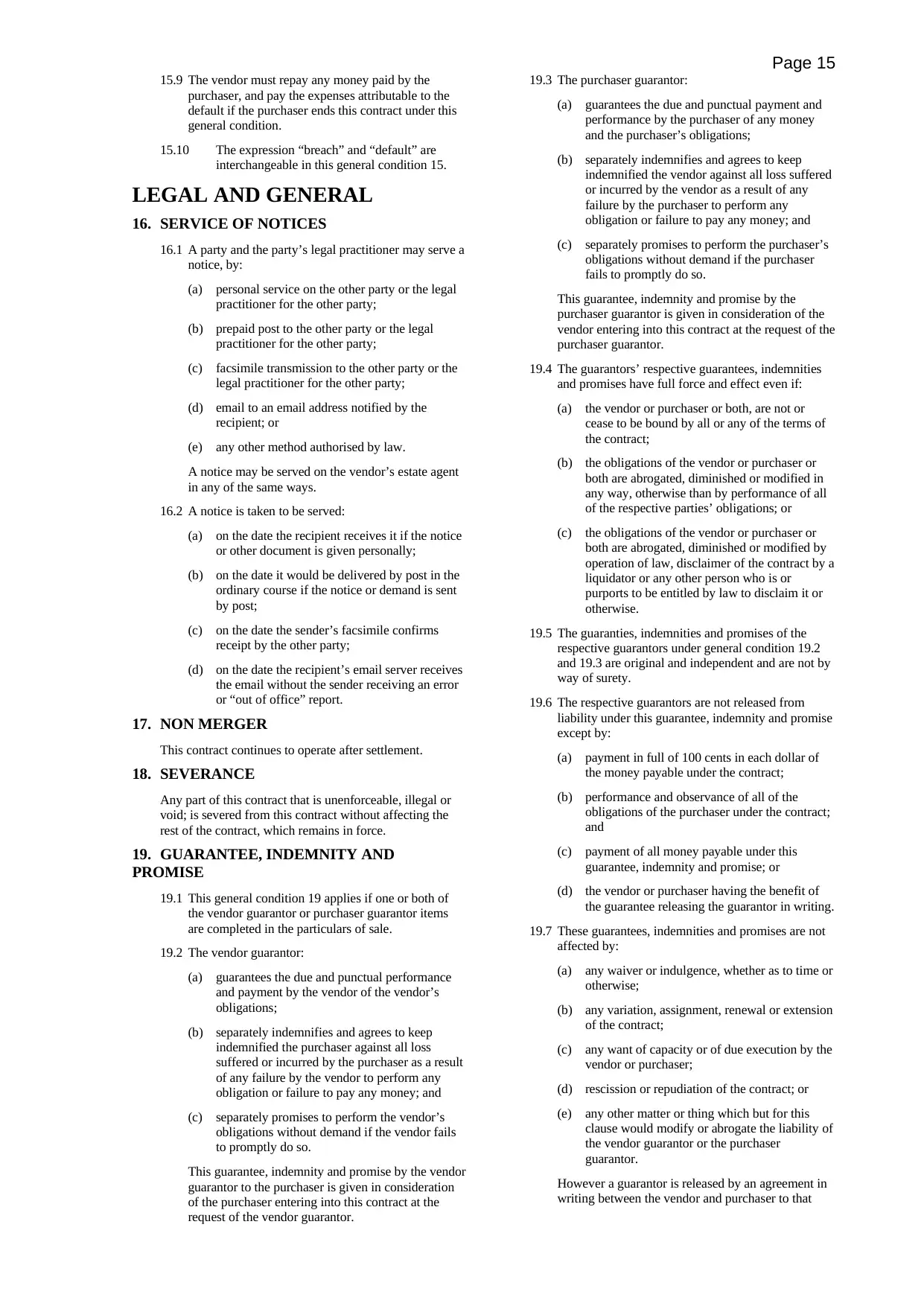
Page 15
15.9 The vendor must repay any money paid by the
purchaser, and pay the expenses attributable to the
default if the purchaser ends this contract under this
general condition.
15.10 The expression “breach” and “default” are
interchangeable in this general condition 15.
LEGAL AND GENERAL
16. SERVICE OF NOTICES
16.1 A party and the party’s legal practitioner may serve a
notice, by:
(a) personal service on the other party or the legal
practitioner for the other party;
(b) prepaid post to the other party or the legal
practitioner for the other party;
(c) facsimile transmission to the other party or the
legal practitioner for the other party;
(d) email to an email address notified by the
recipient; or
(e) any other method authorised by law.
A notice may be served on the vendor’s estate agent
in any of the same ways.
16.2 A notice is taken to be served:
(a) on the date the recipient receives it if the notice
or other document is given personally;
(b) on the date it would be delivered by post in the
ordinary course if the notice or demand is sent
by post;
(c) on the date the sender’s facsimile confirms
receipt by the other party;
(d) on the date the recipient’s email server receives
the email without the sender receiving an error
or “out of office” report.
17. NON MERGER
This contract continues to operate after settlement.
18. SEVERANCE
Any part of this contract that is unenforceable, illegal or
void; is severed from this contract without affecting the
rest of the contract, which remains in force.
19. GUARANTEE, INDEMNITY AND
PROMISE
19.1 This general condition 19 applies if one or both of
the vendor guarantor or purchaser guarantor items
are completed in the particulars of sale.
19.2 The vendor guarantor:
(a) guarantees the due and punctual performance
and payment by the vendor of the vendor’s
obligations;
(b) separately indemnifies and agrees to keep
indemnified the purchaser against all loss
suffered or incurred by the purchaser as a result
of any failure by the vendor to perform any
obligation or failure to pay any money; and
(c) separately promises to perform the vendor’s
obligations without demand if the vendor fails
to promptly do so.
This guarantee, indemnity and promise by the vendor
guarantor to the purchaser is given in consideration
of the purchaser entering into this contract at the
request of the vendor guarantor.
19.3 The purchaser guarantor:
(a) guarantees the due and punctual payment and
performance by the purchaser of any money
and the purchaser’s obligations;
(b) separately indemnifies and agrees to keep
indemnified the vendor against all loss suffered
or incurred by the vendor as a result of any
failure by the purchaser to perform any
obligation or failure to pay any money; and
(c) separately promises to perform the purchaser’s
obligations without demand if the purchaser
fails to promptly do so.
This guarantee, indemnity and promise by the
purchaser guarantor is given in consideration of the
vendor entering into this contract at the request of the
purchaser guarantor.
19.4 The guarantors’ respective guarantees, indemnities
and promises have full force and effect even if:
(a) the vendor or purchaser or both, are not or
cease to be bound by all or any of the terms of
the contract;
(b) the obligations of the vendor or purchaser or
both are abrogated, diminished or modified in
any way, otherwise than by performance of all
of the respective parties’ obligations; or
(c) the obligations of the vendor or purchaser or
both are abrogated, diminished or modified by
operation of law, disclaimer of the contract by a
liquidator or any other person who is or
purports to be entitled by law to disclaim it or
otherwise.
19.5 The guaranties, indemnities and promises of the
respective guarantors under general condition 19.2
and 19.3 are original and independent and are not by
way of surety.
19.6 The respective guarantors are not released from
liability under this guarantee, indemnity and promise
except by:
(a) payment in full of 100 cents in each dollar of
the money payable under the contract;
(b) performance and observance of all of the
obligations of the purchaser under the contract;
and
(c) payment of all money payable under this
guarantee, indemnity and promise; or
(d) the vendor or purchaser having the benefit of
the guarantee releasing the guarantor in writing.
19.7 These guarantees, indemnities and promises are not
affected by:
(a) any waiver or indulgence, whether as to time or
otherwise;
(b) any variation, assignment, renewal or extension
of the contract;
(c) any want of capacity or of due execution by the
vendor or purchaser;
(d) rescission or repudiation of the contract; or
(e) any other matter or thing which but for this
clause would modify or abrogate the liability of
the vendor guarantor or the purchaser
guarantor.
However a guarantor is released by an agreement in
writing between the vendor and purchaser to that
15.9 The vendor must repay any money paid by the
purchaser, and pay the expenses attributable to the
default if the purchaser ends this contract under this
general condition.
15.10 The expression “breach” and “default” are
interchangeable in this general condition 15.
LEGAL AND GENERAL
16. SERVICE OF NOTICES
16.1 A party and the party’s legal practitioner may serve a
notice, by:
(a) personal service on the other party or the legal
practitioner for the other party;
(b) prepaid post to the other party or the legal
practitioner for the other party;
(c) facsimile transmission to the other party or the
legal practitioner for the other party;
(d) email to an email address notified by the
recipient; or
(e) any other method authorised by law.
A notice may be served on the vendor’s estate agent
in any of the same ways.
16.2 A notice is taken to be served:
(a) on the date the recipient receives it if the notice
or other document is given personally;
(b) on the date it would be delivered by post in the
ordinary course if the notice or demand is sent
by post;
(c) on the date the sender’s facsimile confirms
receipt by the other party;
(d) on the date the recipient’s email server receives
the email without the sender receiving an error
or “out of office” report.
17. NON MERGER
This contract continues to operate after settlement.
18. SEVERANCE
Any part of this contract that is unenforceable, illegal or
void; is severed from this contract without affecting the
rest of the contract, which remains in force.
19. GUARANTEE, INDEMNITY AND
PROMISE
19.1 This general condition 19 applies if one or both of
the vendor guarantor or purchaser guarantor items
are completed in the particulars of sale.
19.2 The vendor guarantor:
(a) guarantees the due and punctual performance
and payment by the vendor of the vendor’s
obligations;
(b) separately indemnifies and agrees to keep
indemnified the purchaser against all loss
suffered or incurred by the purchaser as a result
of any failure by the vendor to perform any
obligation or failure to pay any money; and
(c) separately promises to perform the vendor’s
obligations without demand if the vendor fails
to promptly do so.
This guarantee, indemnity and promise by the vendor
guarantor to the purchaser is given in consideration
of the purchaser entering into this contract at the
request of the vendor guarantor.
19.3 The purchaser guarantor:
(a) guarantees the due and punctual payment and
performance by the purchaser of any money
and the purchaser’s obligations;
(b) separately indemnifies and agrees to keep
indemnified the vendor against all loss suffered
or incurred by the vendor as a result of any
failure by the purchaser to perform any
obligation or failure to pay any money; and
(c) separately promises to perform the purchaser’s
obligations without demand if the purchaser
fails to promptly do so.
This guarantee, indemnity and promise by the
purchaser guarantor is given in consideration of the
vendor entering into this contract at the request of the
purchaser guarantor.
19.4 The guarantors’ respective guarantees, indemnities
and promises have full force and effect even if:
(a) the vendor or purchaser or both, are not or
cease to be bound by all or any of the terms of
the contract;
(b) the obligations of the vendor or purchaser or
both are abrogated, diminished or modified in
any way, otherwise than by performance of all
of the respective parties’ obligations; or
(c) the obligations of the vendor or purchaser or
both are abrogated, diminished or modified by
operation of law, disclaimer of the contract by a
liquidator or any other person who is or
purports to be entitled by law to disclaim it or
otherwise.
19.5 The guaranties, indemnities and promises of the
respective guarantors under general condition 19.2
and 19.3 are original and independent and are not by
way of surety.
19.6 The respective guarantors are not released from
liability under this guarantee, indemnity and promise
except by:
(a) payment in full of 100 cents in each dollar of
the money payable under the contract;
(b) performance and observance of all of the
obligations of the purchaser under the contract;
and
(c) payment of all money payable under this
guarantee, indemnity and promise; or
(d) the vendor or purchaser having the benefit of
the guarantee releasing the guarantor in writing.
19.7 These guarantees, indemnities and promises are not
affected by:
(a) any waiver or indulgence, whether as to time or
otherwise;
(b) any variation, assignment, renewal or extension
of the contract;
(c) any want of capacity or of due execution by the
vendor or purchaser;
(d) rescission or repudiation of the contract; or
(e) any other matter or thing which but for this
clause would modify or abrogate the liability of
the vendor guarantor or the purchaser
guarantor.
However a guarantor is released by an agreement in
writing between the vendor and purchaser to that
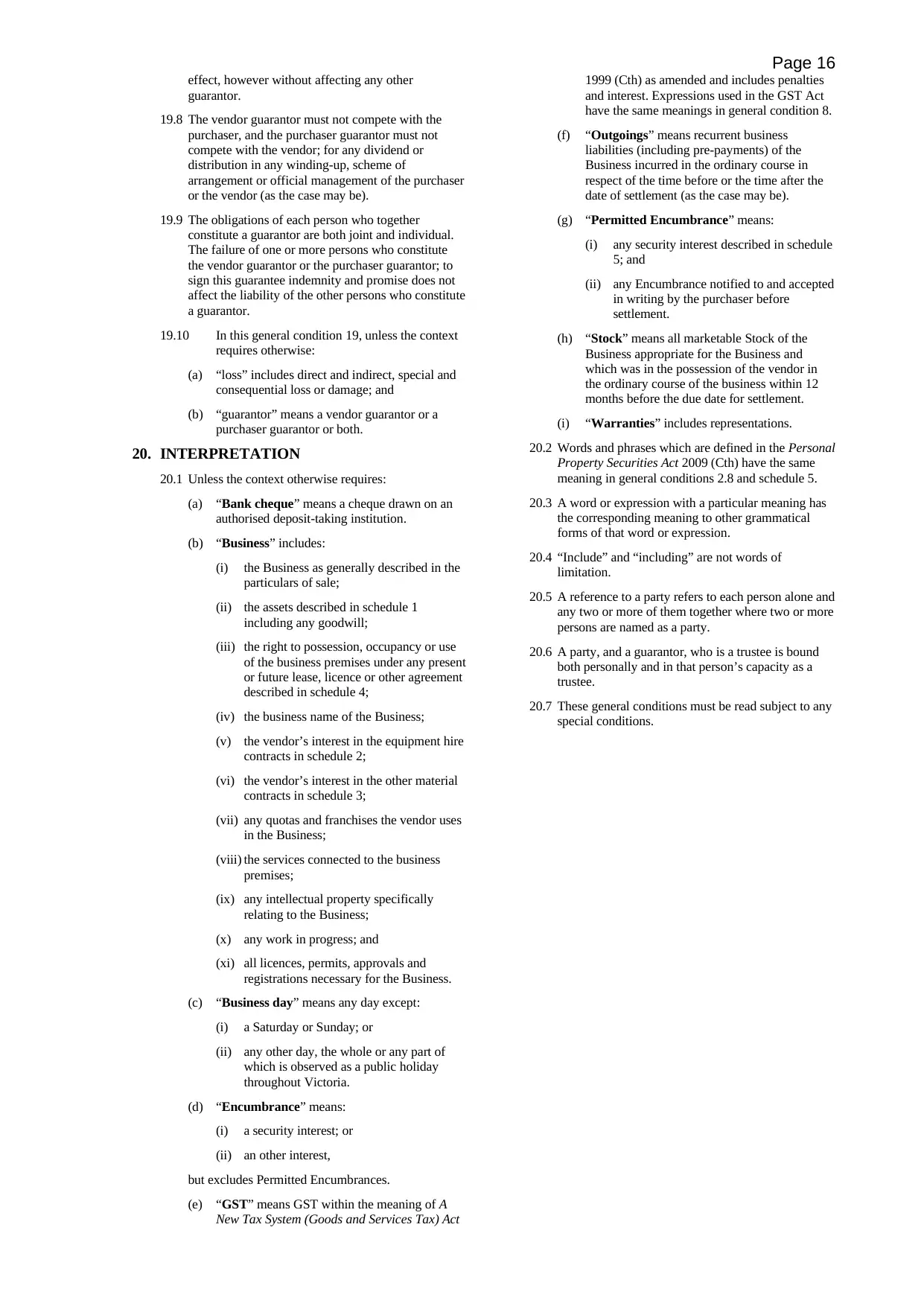
Page 16
effect, however without affecting any other
guarantor.
19.8 The vendor guarantor must not compete with the
purchaser, and the purchaser guarantor must not
compete with the vendor; for any dividend or
distribution in any winding-up, scheme of
arrangement or official management of the purchaser
or the vendor (as the case may be).
19.9 The obligations of each person who together
constitute a guarantor are both joint and individual.
The failure of one or more persons who constitute
the vendor guarantor or the purchaser guarantor; to
sign this guarantee indemnity and promise does not
affect the liability of the other persons who constitute
a guarantor.
19.10 In this general condition 19, unless the context
requires otherwise:
(a) “loss” includes direct and indirect, special and
consequential loss or damage; and
(b) “guarantor” means a vendor guarantor or a
purchaser guarantor or both.
20. INTERPRETATION
20.1 Unless the context otherwise requires:
(a) “Bank cheque” means a cheque drawn on an
authorised deposit-taking institution.
(b) “Business” includes:
(i) the Business as generally described in the
particulars of sale;
(ii) the assets described in schedule 1
including any goodwill;
(iii) the right to possession, occupancy or use
of the business premises under any present
or future lease, licence or other agreement
described in schedule 4;
(iv) the business name of the Business;
(v) the vendor’s interest in the equipment hire
contracts in schedule 2;
(vi) the vendor’s interest in the other material
contracts in schedule 3;
(vii) any quotas and franchises the vendor uses
in the Business;
(viii) the services connected to the business
premises;
(ix) any intellectual property specifically
relating to the Business;
(x) any work in progress; and
(xi) all licences, permits, approvals and
registrations necessary for the Business.
(c) “Business day” means any day except:
(i) a Saturday or Sunday; or
(ii) any other day, the whole or any part of
which is observed as a public holiday
throughout Victoria.
(d) “Encumbrance” means:
(i) a security interest; or
(ii) an other interest,
but excludes Permitted Encumbrances.
(e) “GST” means GST within the meaning of A
New Tax System (Goods and Services Tax) Act
1999 (Cth) as amended and includes penalties
and interest. Expressions used in the GST Act
have the same meanings in general condition 8.
(f) “Outgoings” means recurrent business
liabilities (including pre-payments) of the
Business incurred in the ordinary course in
respect of the time before or the time after the
date of settlement (as the case may be).
(g) “Permitted Encumbrance” means:
(i) any security interest described in schedule
5; and
(ii) any Encumbrance notified to and accepted
in writing by the purchaser before
settlement.
(h) “Stock” means all marketable Stock of the
Business appropriate for the Business and
which was in the possession of the vendor in
the ordinary course of the business within 12
months before the due date for settlement.
(i) “Warranties” includes representations.
20.2 Words and phrases which are defined in the Personal
Property Securities Act 2009 (Cth) have the same
meaning in general conditions 2.8 and schedule 5.
20.3 A word or expression with a particular meaning has
the corresponding meaning to other grammatical
forms of that word or expression.
20.4 “Include” and “including” are not words of
limitation.
20.5 A reference to a party refers to each person alone and
any two or more of them together where two or more
persons are named as a party.
20.6 A party, and a guarantor, who is a trustee is bound
both personally and in that person’s capacity as a
trustee.
20.7 These general conditions must be read subject to any
special conditions.
effect, however without affecting any other
guarantor.
19.8 The vendor guarantor must not compete with the
purchaser, and the purchaser guarantor must not
compete with the vendor; for any dividend or
distribution in any winding-up, scheme of
arrangement or official management of the purchaser
or the vendor (as the case may be).
19.9 The obligations of each person who together
constitute a guarantor are both joint and individual.
The failure of one or more persons who constitute
the vendor guarantor or the purchaser guarantor; to
sign this guarantee indemnity and promise does not
affect the liability of the other persons who constitute
a guarantor.
19.10 In this general condition 19, unless the context
requires otherwise:
(a) “loss” includes direct and indirect, special and
consequential loss or damage; and
(b) “guarantor” means a vendor guarantor or a
purchaser guarantor or both.
20. INTERPRETATION
20.1 Unless the context otherwise requires:
(a) “Bank cheque” means a cheque drawn on an
authorised deposit-taking institution.
(b) “Business” includes:
(i) the Business as generally described in the
particulars of sale;
(ii) the assets described in schedule 1
including any goodwill;
(iii) the right to possession, occupancy or use
of the business premises under any present
or future lease, licence or other agreement
described in schedule 4;
(iv) the business name of the Business;
(v) the vendor’s interest in the equipment hire
contracts in schedule 2;
(vi) the vendor’s interest in the other material
contracts in schedule 3;
(vii) any quotas and franchises the vendor uses
in the Business;
(viii) the services connected to the business
premises;
(ix) any intellectual property specifically
relating to the Business;
(x) any work in progress; and
(xi) all licences, permits, approvals and
registrations necessary for the Business.
(c) “Business day” means any day except:
(i) a Saturday or Sunday; or
(ii) any other day, the whole or any part of
which is observed as a public holiday
throughout Victoria.
(d) “Encumbrance” means:
(i) a security interest; or
(ii) an other interest,
but excludes Permitted Encumbrances.
(e) “GST” means GST within the meaning of A
New Tax System (Goods and Services Tax) Act
1999 (Cth) as amended and includes penalties
and interest. Expressions used in the GST Act
have the same meanings in general condition 8.
(f) “Outgoings” means recurrent business
liabilities (including pre-payments) of the
Business incurred in the ordinary course in
respect of the time before or the time after the
date of settlement (as the case may be).
(g) “Permitted Encumbrance” means:
(i) any security interest described in schedule
5; and
(ii) any Encumbrance notified to and accepted
in writing by the purchaser before
settlement.
(h) “Stock” means all marketable Stock of the
Business appropriate for the Business and
which was in the possession of the vendor in
the ordinary course of the business within 12
months before the due date for settlement.
(i) “Warranties” includes representations.
20.2 Words and phrases which are defined in the Personal
Property Securities Act 2009 (Cth) have the same
meaning in general conditions 2.8 and schedule 5.
20.3 A word or expression with a particular meaning has
the corresponding meaning to other grammatical
forms of that word or expression.
20.4 “Include” and “including” are not words of
limitation.
20.5 A reference to a party refers to each person alone and
any two or more of them together where two or more
persons are named as a party.
20.6 A party, and a guarantor, who is a trustee is bound
both personally and in that person’s capacity as a
trustee.
20.7 These general conditions must be read subject to any
special conditions.
Secure Best Marks with AI Grader
Need help grading? Try our AI Grader for instant feedback on your assignments.
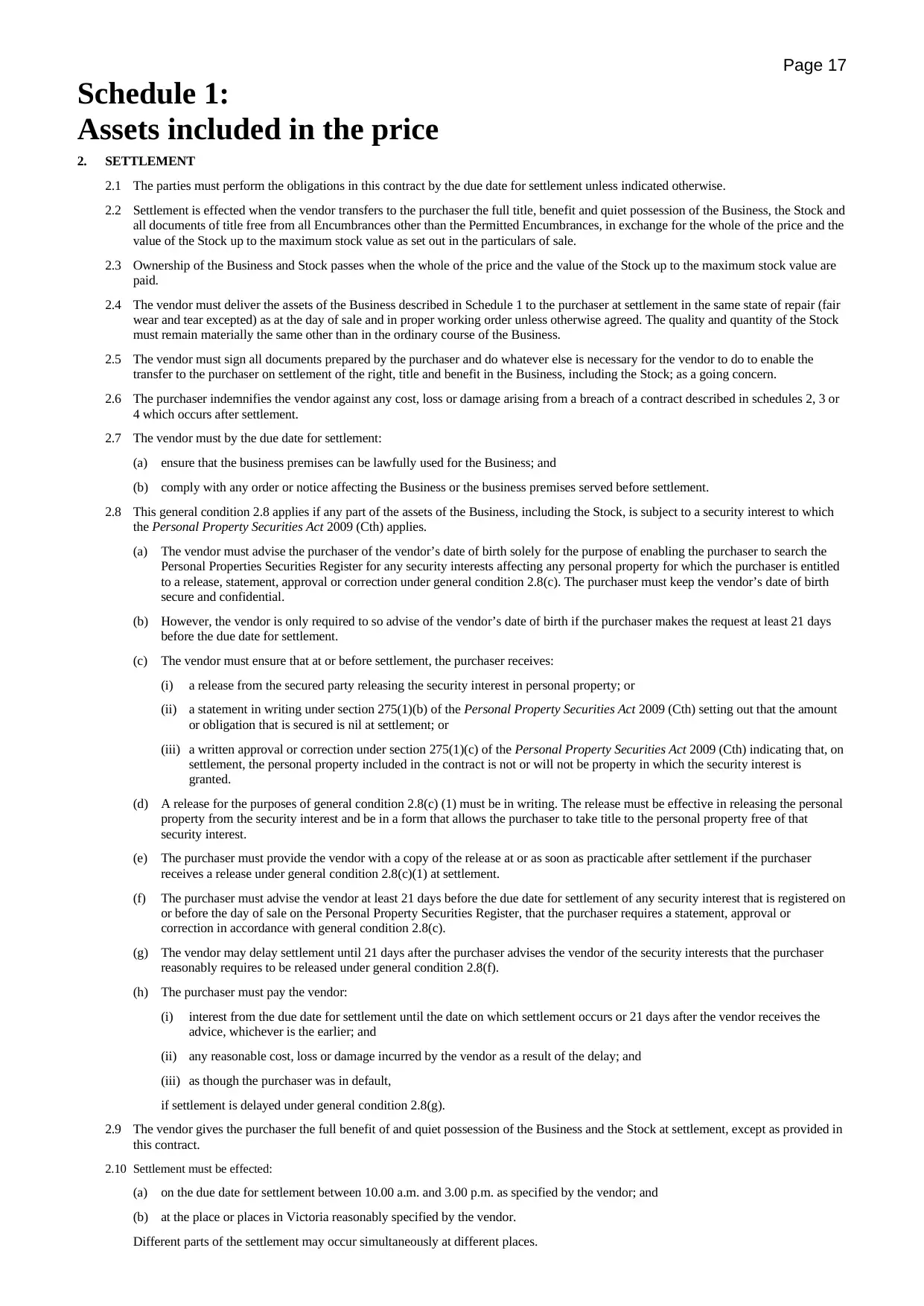
Page 17
Schedule 1:
Assets included in the price
2. SETTLEMENT
2.1 The parties must perform the obligations in this contract by the due date for settlement unless indicated otherwise.
2.2 Settlement is effected when the vendor transfers to the purchaser the full title, benefit and quiet possession of the Business, the Stock and
all documents of title free from all Encumbrances other than the Permitted Encumbrances, in exchange for the whole of the price and the
value of the Stock up to the maximum stock value as set out in the particulars of sale.
2.3 Ownership of the Business and Stock passes when the whole of the price and the value of the Stock up to the maximum stock value are
paid.
2.4 The vendor must deliver the assets of the Business described in Schedule 1 to the purchaser at settlement in the same state of repair (fair
wear and tear excepted) as at the day of sale and in proper working order unless otherwise agreed. The quality and quantity of the Stock
must remain materially the same other than in the ordinary course of the Business.
2.5 The vendor must sign all documents prepared by the purchaser and do whatever else is necessary for the vendor to do to enable the
transfer to the purchaser on settlement of the right, title and benefit in the Business, including the Stock; as a going concern.
2.6 The purchaser indemnifies the vendor against any cost, loss or damage arising from a breach of a contract described in schedules 2, 3 or
4 which occurs after settlement.
2.7 The vendor must by the due date for settlement:
(a) ensure that the business premises can be lawfully used for the Business; and
(b) comply with any order or notice affecting the Business or the business premises served before settlement.
2.8 This general condition 2.8 applies if any part of the assets of the Business, including the Stock, is subject to a security interest to which
the Personal Property Securities Act 2009 (Cth) applies.
(a) The vendor must advise the purchaser of the vendor’s date of birth solely for the purpose of enabling the purchaser to search the
Personal Properties Securities Register for any security interests affecting any personal property for which the purchaser is entitled
to a release, statement, approval or correction under general condition 2.8(c). The purchaser must keep the vendor’s date of birth
secure and confidential.
(b) However, the vendor is only required to so advise of the vendor’s date of birth if the purchaser makes the request at least 21 days
before the due date for settlement.
(c) The vendor must ensure that at or before settlement, the purchaser receives:
(i) a release from the secured party releasing the security interest in personal property; or
(ii) a statement in writing under section 275(1)(b) of the Personal Property Securities Act 2009 (Cth) setting out that the amount
or obligation that is secured is nil at settlement; or
(iii) a written approval or correction under section 275(1)(c) of the Personal Property Securities Act 2009 (Cth) indicating that, on
settlement, the personal property included in the contract is not or will not be property in which the security interest is
granted.
(d) A release for the purposes of general condition 2.8(c) (1) must be in writing. The release must be effective in releasing the personal
property from the security interest and be in a form that allows the purchaser to take title to the personal property free of that
security interest.
(e) The purchaser must provide the vendor with a copy of the release at or as soon as practicable after settlement if the purchaser
receives a release under general condition 2.8(c)(1) at settlement.
(f) The purchaser must advise the vendor at least 21 days before the due date for settlement of any security interest that is registered on
or before the day of sale on the Personal Property Securities Register, that the purchaser requires a statement, approval or
correction in accordance with general condition 2.8(c).
(g) The vendor may delay settlement until 21 days after the purchaser advises the vendor of the security interests that the purchaser
reasonably requires to be released under general condition 2.8(f).
(h) The purchaser must pay the vendor:
(i) interest from the due date for settlement until the date on which settlement occurs or 21 days after the vendor receives the
advice, whichever is the earlier; and
(ii) any reasonable cost, loss or damage incurred by the vendor as a result of the delay; and
(iii) as though the purchaser was in default,
if settlement is delayed under general condition 2.8(g).
2.9 The vendor gives the purchaser the full benefit of and quiet possession of the Business and the Stock at settlement, except as provided in
this contract.
2.10 Settlement must be effected:
(a) on the due date for settlement between 10.00 a.m. and 3.00 p.m. as specified by the vendor; and
(b) at the place or places in Victoria reasonably specified by the vendor.
Different parts of the settlement may occur simultaneously at different places.
Schedule 1:
Assets included in the price
2. SETTLEMENT
2.1 The parties must perform the obligations in this contract by the due date for settlement unless indicated otherwise.
2.2 Settlement is effected when the vendor transfers to the purchaser the full title, benefit and quiet possession of the Business, the Stock and
all documents of title free from all Encumbrances other than the Permitted Encumbrances, in exchange for the whole of the price and the
value of the Stock up to the maximum stock value as set out in the particulars of sale.
2.3 Ownership of the Business and Stock passes when the whole of the price and the value of the Stock up to the maximum stock value are
paid.
2.4 The vendor must deliver the assets of the Business described in Schedule 1 to the purchaser at settlement in the same state of repair (fair
wear and tear excepted) as at the day of sale and in proper working order unless otherwise agreed. The quality and quantity of the Stock
must remain materially the same other than in the ordinary course of the Business.
2.5 The vendor must sign all documents prepared by the purchaser and do whatever else is necessary for the vendor to do to enable the
transfer to the purchaser on settlement of the right, title and benefit in the Business, including the Stock; as a going concern.
2.6 The purchaser indemnifies the vendor against any cost, loss or damage arising from a breach of a contract described in schedules 2, 3 or
4 which occurs after settlement.
2.7 The vendor must by the due date for settlement:
(a) ensure that the business premises can be lawfully used for the Business; and
(b) comply with any order or notice affecting the Business or the business premises served before settlement.
2.8 This general condition 2.8 applies if any part of the assets of the Business, including the Stock, is subject to a security interest to which
the Personal Property Securities Act 2009 (Cth) applies.
(a) The vendor must advise the purchaser of the vendor’s date of birth solely for the purpose of enabling the purchaser to search the
Personal Properties Securities Register for any security interests affecting any personal property for which the purchaser is entitled
to a release, statement, approval or correction under general condition 2.8(c). The purchaser must keep the vendor’s date of birth
secure and confidential.
(b) However, the vendor is only required to so advise of the vendor’s date of birth if the purchaser makes the request at least 21 days
before the due date for settlement.
(c) The vendor must ensure that at or before settlement, the purchaser receives:
(i) a release from the secured party releasing the security interest in personal property; or
(ii) a statement in writing under section 275(1)(b) of the Personal Property Securities Act 2009 (Cth) setting out that the amount
or obligation that is secured is nil at settlement; or
(iii) a written approval or correction under section 275(1)(c) of the Personal Property Securities Act 2009 (Cth) indicating that, on
settlement, the personal property included in the contract is not or will not be property in which the security interest is
granted.
(d) A release for the purposes of general condition 2.8(c) (1) must be in writing. The release must be effective in releasing the personal
property from the security interest and be in a form that allows the purchaser to take title to the personal property free of that
security interest.
(e) The purchaser must provide the vendor with a copy of the release at or as soon as practicable after settlement if the purchaser
receives a release under general condition 2.8(c)(1) at settlement.
(f) The purchaser must advise the vendor at least 21 days before the due date for settlement of any security interest that is registered on
or before the day of sale on the Personal Property Securities Register, that the purchaser requires a statement, approval or
correction in accordance with general condition 2.8(c).
(g) The vendor may delay settlement until 21 days after the purchaser advises the vendor of the security interests that the purchaser
reasonably requires to be released under general condition 2.8(f).
(h) The purchaser must pay the vendor:
(i) interest from the due date for settlement until the date on which settlement occurs or 21 days after the vendor receives the
advice, whichever is the earlier; and
(ii) any reasonable cost, loss or damage incurred by the vendor as a result of the delay; and
(iii) as though the purchaser was in default,
if settlement is delayed under general condition 2.8(g).
2.9 The vendor gives the purchaser the full benefit of and quiet possession of the Business and the Stock at settlement, except as provided in
this contract.
2.10 Settlement must be effected:
(a) on the due date for settlement between 10.00 a.m. and 3.00 p.m. as specified by the vendor; and
(b) at the place or places in Victoria reasonably specified by the vendor.
Different parts of the settlement may occur simultaneously at different places.
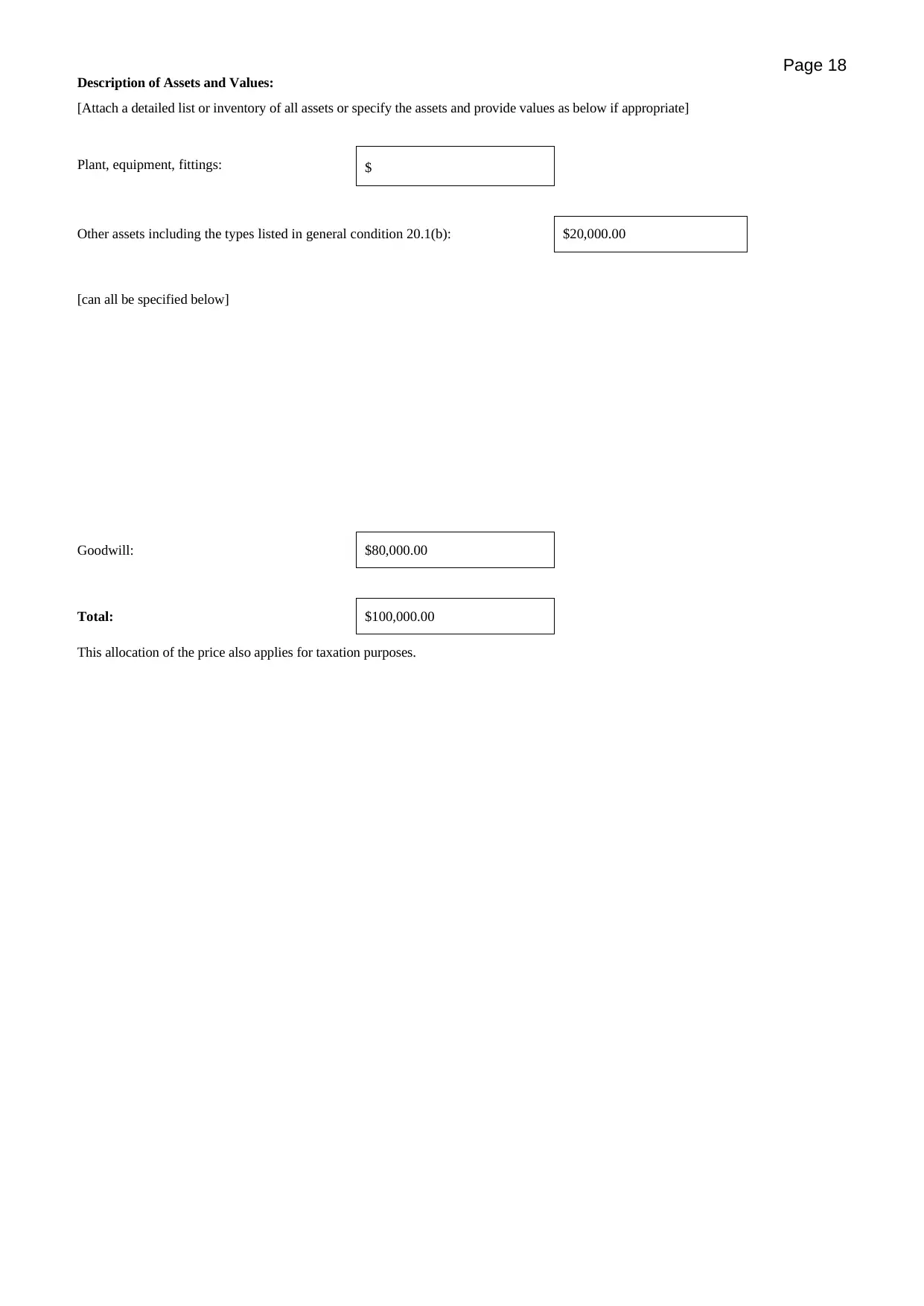
Page 18
Description of Assets and Values:
[Attach a detailed list or inventory of all assets or specify the assets and provide values as below if appropriate]
Plant, equipment, fittings: $
Other assets including the types listed in general condition 20.1(b): $20,000.00
[can all be specified below]
Goodwill: $80,000.00
Total: $100,000.00
This allocation of the price also applies for taxation purposes.
Description of Assets and Values:
[Attach a detailed list or inventory of all assets or specify the assets and provide values as below if appropriate]
Plant, equipment, fittings: $
Other assets including the types listed in general condition 20.1(b): $20,000.00
[can all be specified below]
Goodwill: $80,000.00
Total: $100,000.00
This allocation of the price also applies for taxation purposes.
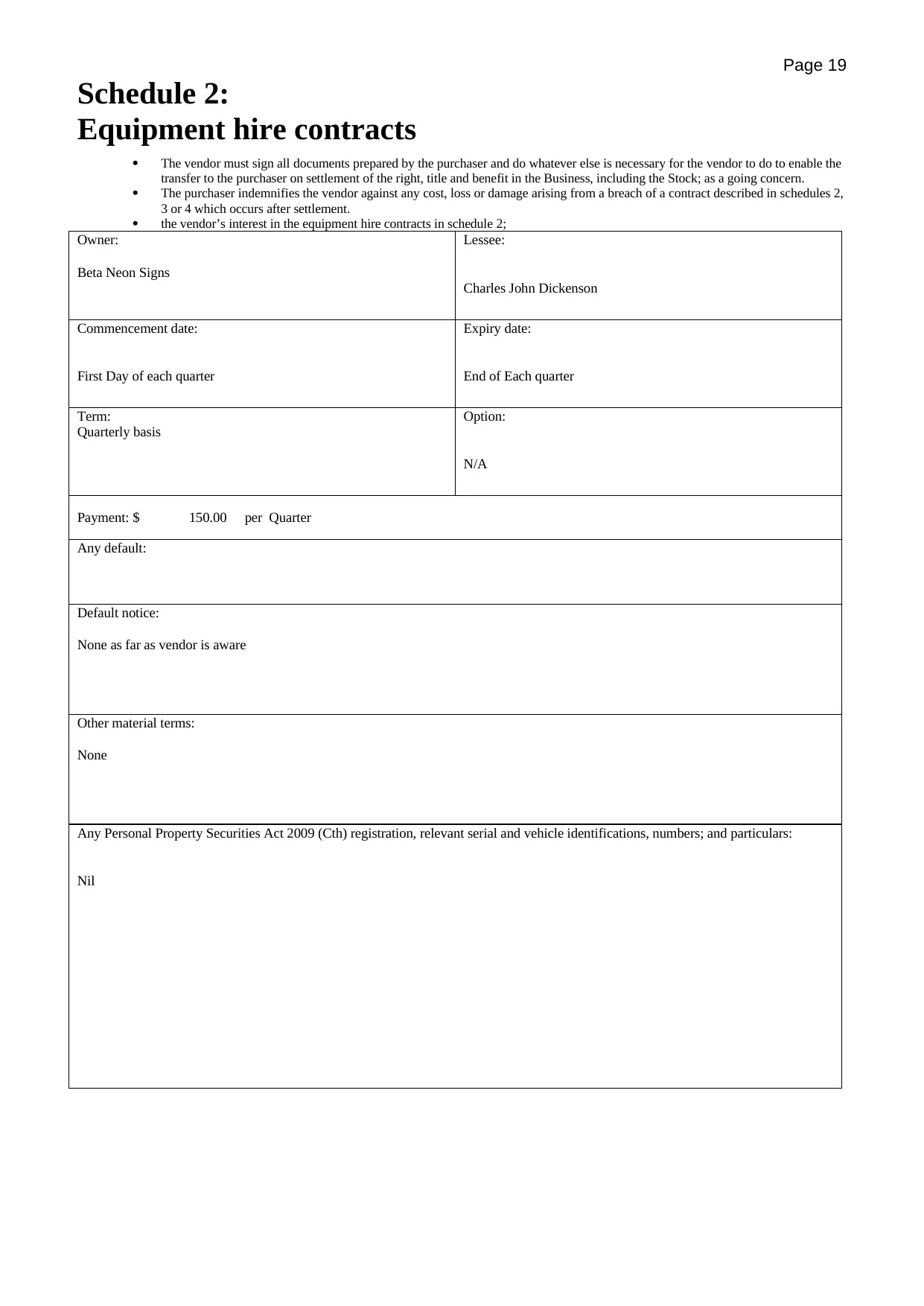
Page 19
Schedule 2:
Equipment hire contracts
The vendor must sign all documents prepared by the purchaser and do whatever else is necessary for the vendor to do to enable the
transfer to the purchaser on settlement of the right, title and benefit in the Business, including the Stock; as a going concern.
The purchaser indemnifies the vendor against any cost, loss or damage arising from a breach of a contract described in schedules 2,
3 or 4 which occurs after settlement.
the vendor’s interest in the equipment hire contracts in schedule 2;
Owner:
Beta Neon Signs
Lessee:
Charles John Dickenson
Commencement date:
First Day of each quarter
Expiry date:
End of Each quarter
Term:
Quarterly basis
Option:
N/A
Payment: $ 150.00 per Quarter
Any default:
Default notice:
None as far as vendor is aware
Other material terms:
None
Any Personal Property Securities Act 2009 (Cth) registration, relevant serial and vehicle identifications, numbers; and particulars:
Nil
Schedule 2:
Equipment hire contracts
The vendor must sign all documents prepared by the purchaser and do whatever else is necessary for the vendor to do to enable the
transfer to the purchaser on settlement of the right, title and benefit in the Business, including the Stock; as a going concern.
The purchaser indemnifies the vendor against any cost, loss or damage arising from a breach of a contract described in schedules 2,
3 or 4 which occurs after settlement.
the vendor’s interest in the equipment hire contracts in schedule 2;
Owner:
Beta Neon Signs
Lessee:
Charles John Dickenson
Commencement date:
First Day of each quarter
Expiry date:
End of Each quarter
Term:
Quarterly basis
Option:
N/A
Payment: $ 150.00 per Quarter
Any default:
Default notice:
None as far as vendor is aware
Other material terms:
None
Any Personal Property Securities Act 2009 (Cth) registration, relevant serial and vehicle identifications, numbers; and particulars:
Nil
Paraphrase This Document
Need a fresh take? Get an instant paraphrase of this document with our AI Paraphraser

Page 20
Schedule 3:
Other material contracts
The vendor must sign all documents prepared by the purchaser and do whatever else is necessary for the vendor to do to enable the
transfer to the purchaser on settlement of the right, title and benefit in the Business, including the Stock; as a going concern.
The purchaser indemnifies the vendor against any cost, loss or damage arising from a breach of a contract described in schedules 2,
3 or 4 which occurs after settlement.
the vendor’s interest in the other material contracts in schedule 3;
Schedule 3:
Other material contracts
The vendor must sign all documents prepared by the purchaser and do whatever else is necessary for the vendor to do to enable the
transfer to the purchaser on settlement of the right, title and benefit in the Business, including the Stock; as a going concern.
The purchaser indemnifies the vendor against any cost, loss or damage arising from a breach of a contract described in schedules 2,
3 or 4 which occurs after settlement.
the vendor’s interest in the other material contracts in schedule 3;
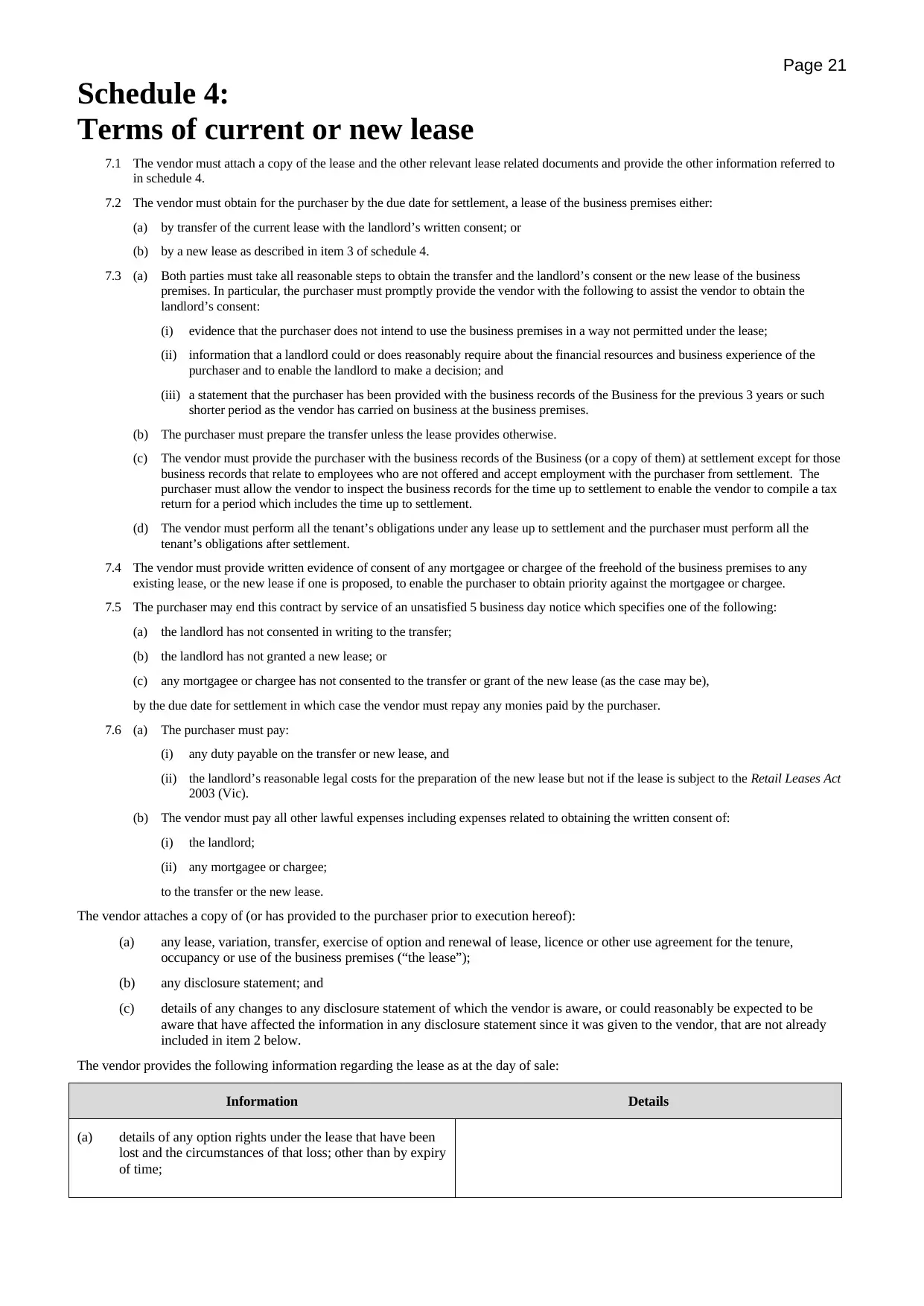
Page 21
Schedule 4:
Terms of current or new lease
7.1 The vendor must attach a copy of the lease and the other relevant lease related documents and provide the other information referred to
in schedule 4.
7.2 The vendor must obtain for the purchaser by the due date for settlement, a lease of the business premises either:
(a) by transfer of the current lease with the landlord’s written consent; or
(b) by a new lease as described in item 3 of schedule 4.
7.3 (a) Both parties must take all reasonable steps to obtain the transfer and the landlord’s consent or the new lease of the business
premises. In particular, the purchaser must promptly provide the vendor with the following to assist the vendor to obtain the
landlord’s consent:
(i) evidence that the purchaser does not intend to use the business premises in a way not permitted under the lease;
(ii) information that a landlord could or does reasonably require about the financial resources and business experience of the
purchaser and to enable the landlord to make a decision; and
(iii) a statement that the purchaser has been provided with the business records of the Business for the previous 3 years or such
shorter period as the vendor has carried on business at the business premises.
(b) The purchaser must prepare the transfer unless the lease provides otherwise.
(c) The vendor must provide the purchaser with the business records of the Business (or a copy of them) at settlement except for those
business records that relate to employees who are not offered and accept employment with the purchaser from settlement. The
purchaser must allow the vendor to inspect the business records for the time up to settlement to enable the vendor to compile a tax
return for a period which includes the time up to settlement.
(d) The vendor must perform all the tenant’s obligations under any lease up to settlement and the purchaser must perform all the
tenant’s obligations after settlement.
7.4 The vendor must provide written evidence of consent of any mortgagee or chargee of the freehold of the business premises to any
existing lease, or the new lease if one is proposed, to enable the purchaser to obtain priority against the mortgagee or chargee.
7.5 The purchaser may end this contract by service of an unsatisfied 5 business day notice which specifies one of the following:
(a) the landlord has not consented in writing to the transfer;
(b) the landlord has not granted a new lease; or
(c) any mortgagee or chargee has not consented to the transfer or grant of the new lease (as the case may be),
by the due date for settlement in which case the vendor must repay any monies paid by the purchaser.
7.6 (a) The purchaser must pay:
(i) any duty payable on the transfer or new lease, and
(ii) the landlord’s reasonable legal costs for the preparation of the new lease but not if the lease is subject to the Retail Leases Act
2003 (Vic).
(b) The vendor must pay all other lawful expenses including expenses related to obtaining the written consent of:
(i) the landlord;
(ii) any mortgagee or chargee;
to the transfer or the new lease.
The vendor attaches a copy of (or has provided to the purchaser prior to execution hereof):
(a) any lease, variation, transfer, exercise of option and renewal of lease, licence or other use agreement for the tenure,
occupancy or use of the business premises (“the lease”);
(b) any disclosure statement; and
(c) details of any changes to any disclosure statement of which the vendor is aware, or could reasonably be expected to be
aware that have affected the information in any disclosure statement since it was given to the vendor, that are not already
included in item 2 below.
The vendor provides the following information regarding the lease as at the day of sale:
Information Details
(a) details of any option rights under the lease that have been
lost and the circumstances of that loss; other than by expiry
of time;
Schedule 4:
Terms of current or new lease
7.1 The vendor must attach a copy of the lease and the other relevant lease related documents and provide the other information referred to
in schedule 4.
7.2 The vendor must obtain for the purchaser by the due date for settlement, a lease of the business premises either:
(a) by transfer of the current lease with the landlord’s written consent; or
(b) by a new lease as described in item 3 of schedule 4.
7.3 (a) Both parties must take all reasonable steps to obtain the transfer and the landlord’s consent or the new lease of the business
premises. In particular, the purchaser must promptly provide the vendor with the following to assist the vendor to obtain the
landlord’s consent:
(i) evidence that the purchaser does not intend to use the business premises in a way not permitted under the lease;
(ii) information that a landlord could or does reasonably require about the financial resources and business experience of the
purchaser and to enable the landlord to make a decision; and
(iii) a statement that the purchaser has been provided with the business records of the Business for the previous 3 years or such
shorter period as the vendor has carried on business at the business premises.
(b) The purchaser must prepare the transfer unless the lease provides otherwise.
(c) The vendor must provide the purchaser with the business records of the Business (or a copy of them) at settlement except for those
business records that relate to employees who are not offered and accept employment with the purchaser from settlement. The
purchaser must allow the vendor to inspect the business records for the time up to settlement to enable the vendor to compile a tax
return for a period which includes the time up to settlement.
(d) The vendor must perform all the tenant’s obligations under any lease up to settlement and the purchaser must perform all the
tenant’s obligations after settlement.
7.4 The vendor must provide written evidence of consent of any mortgagee or chargee of the freehold of the business premises to any
existing lease, or the new lease if one is proposed, to enable the purchaser to obtain priority against the mortgagee or chargee.
7.5 The purchaser may end this contract by service of an unsatisfied 5 business day notice which specifies one of the following:
(a) the landlord has not consented in writing to the transfer;
(b) the landlord has not granted a new lease; or
(c) any mortgagee or chargee has not consented to the transfer or grant of the new lease (as the case may be),
by the due date for settlement in which case the vendor must repay any monies paid by the purchaser.
7.6 (a) The purchaser must pay:
(i) any duty payable on the transfer or new lease, and
(ii) the landlord’s reasonable legal costs for the preparation of the new lease but not if the lease is subject to the Retail Leases Act
2003 (Vic).
(b) The vendor must pay all other lawful expenses including expenses related to obtaining the written consent of:
(i) the landlord;
(ii) any mortgagee or chargee;
to the transfer or the new lease.
The vendor attaches a copy of (or has provided to the purchaser prior to execution hereof):
(a) any lease, variation, transfer, exercise of option and renewal of lease, licence or other use agreement for the tenure,
occupancy or use of the business premises (“the lease”);
(b) any disclosure statement; and
(c) details of any changes to any disclosure statement of which the vendor is aware, or could reasonably be expected to be
aware that have affected the information in any disclosure statement since it was given to the vendor, that are not already
included in item 2 below.
The vendor provides the following information regarding the lease as at the day of sale:
Information Details
(a) details of any option rights under the lease that have been
lost and the circumstances of that loss; other than by expiry
of time;
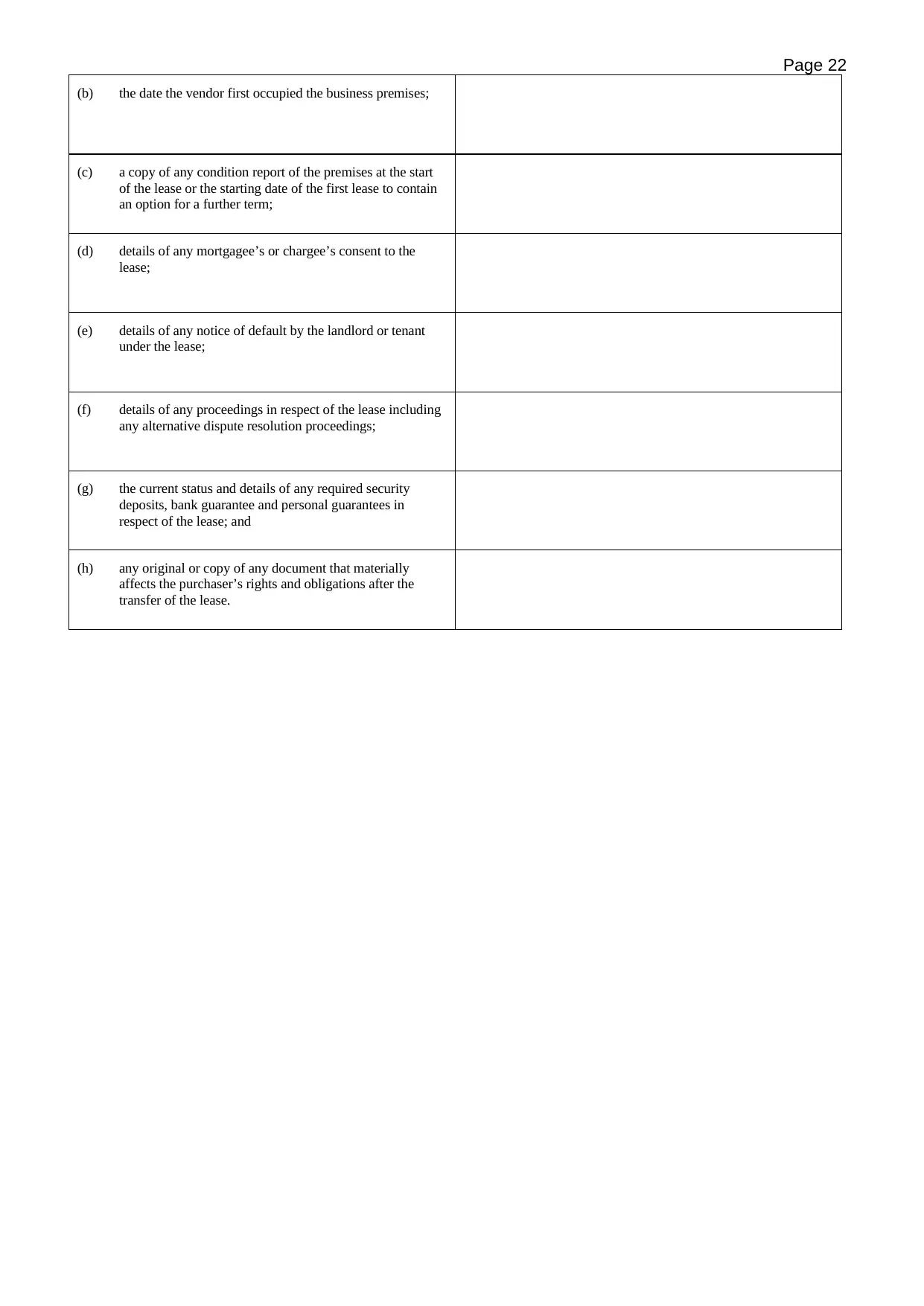
Page 22
(b) the date the vendor first occupied the business premises;
(c) a copy of any condition report of the premises at the start
of the lease or the starting date of the first lease to contain
an option for a further term;
(d) details of any mortgagee’s or chargee’s consent to the
lease;
(e) details of any notice of default by the landlord or tenant
under the lease;
(f) details of any proceedings in respect of the lease including
any alternative dispute resolution proceedings;
(g) the current status and details of any required security
deposits, bank guarantee and personal guarantees in
respect of the lease; and
(h) any original or copy of any document that materially
affects the purchaser’s rights and obligations after the
transfer of the lease.
(b) the date the vendor first occupied the business premises;
(c) a copy of any condition report of the premises at the start
of the lease or the starting date of the first lease to contain
an option for a further term;
(d) details of any mortgagee’s or chargee’s consent to the
lease;
(e) details of any notice of default by the landlord or tenant
under the lease;
(f) details of any proceedings in respect of the lease including
any alternative dispute resolution proceedings;
(g) the current status and details of any required security
deposits, bank guarantee and personal guarantees in
respect of the lease; and
(h) any original or copy of any document that materially
affects the purchaser’s rights and obligations after the
transfer of the lease.
Secure Best Marks with AI Grader
Need help grading? Try our AI Grader for instant feedback on your assignments.
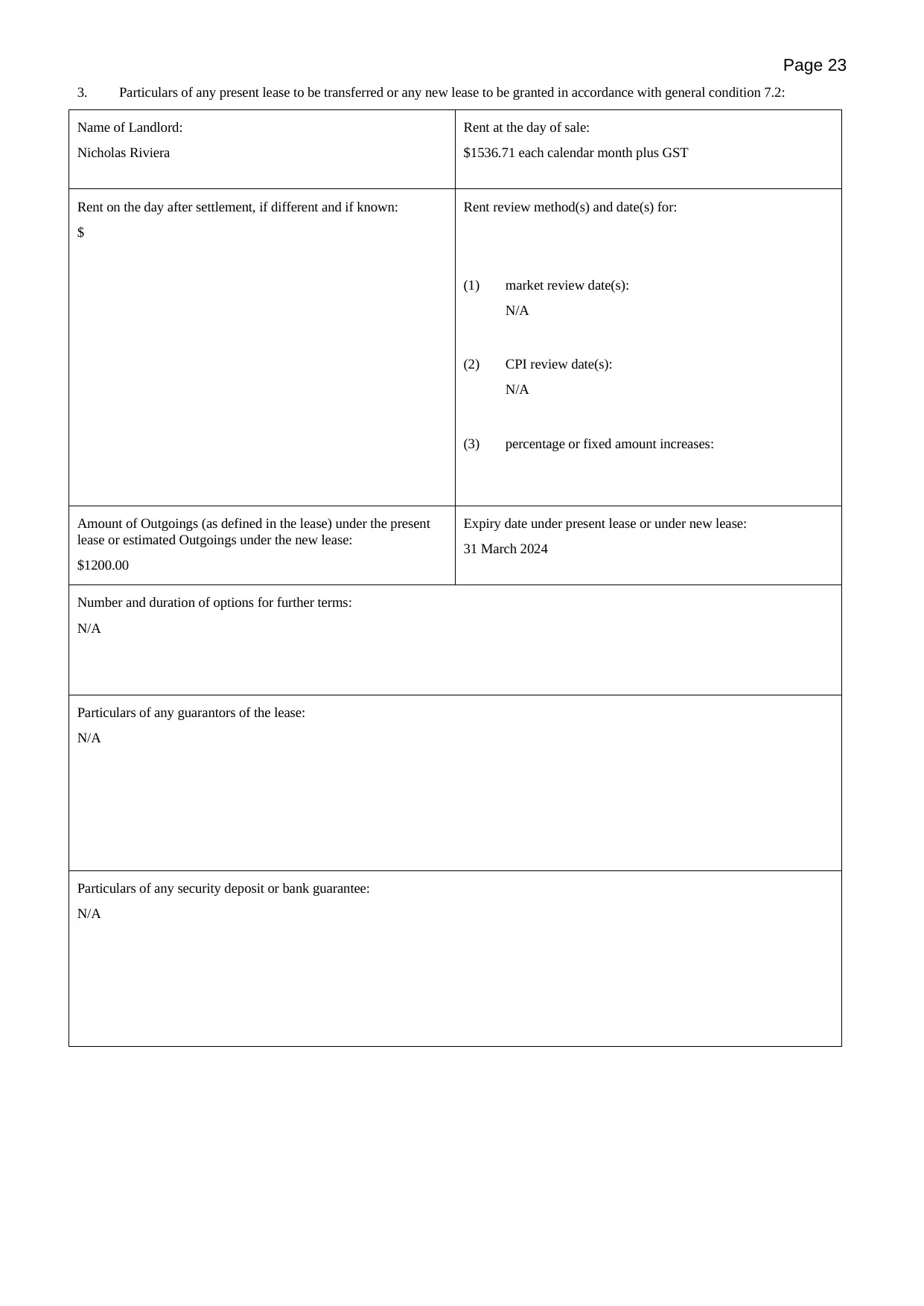
Page 23
3. Particulars of any present lease to be transferred or any new lease to be granted in accordance with general condition 7.2:
Name of Landlord:
Nicholas Riviera
Rent at the day of sale:
$1536.71 each calendar month plus GST
Rent on the day after settlement, if different and if known:
$
Rent review method(s) and date(s) for:
(1) market review date(s):
N/A
(2) CPI review date(s):
N/A
(3) percentage or fixed amount increases:
Amount of Outgoings (as defined in the lease) under the present
lease or estimated Outgoings under the new lease:
$1200.00
Expiry date under present lease or under new lease:
31 March 2024
Number and duration of options for further terms:
N/A
Particulars of any guarantors of the lease:
N/A
Particulars of any security deposit or bank guarantee:
N/A
3. Particulars of any present lease to be transferred or any new lease to be granted in accordance with general condition 7.2:
Name of Landlord:
Nicholas Riviera
Rent at the day of sale:
$1536.71 each calendar month plus GST
Rent on the day after settlement, if different and if known:
$
Rent review method(s) and date(s) for:
(1) market review date(s):
N/A
(2) CPI review date(s):
N/A
(3) percentage or fixed amount increases:
Amount of Outgoings (as defined in the lease) under the present
lease or estimated Outgoings under the new lease:
$1200.00
Expiry date under present lease or under new lease:
31 March 2024
Number and duration of options for further terms:
N/A
Particulars of any guarantors of the lease:
N/A
Particulars of any security deposit or bank guarantee:
N/A
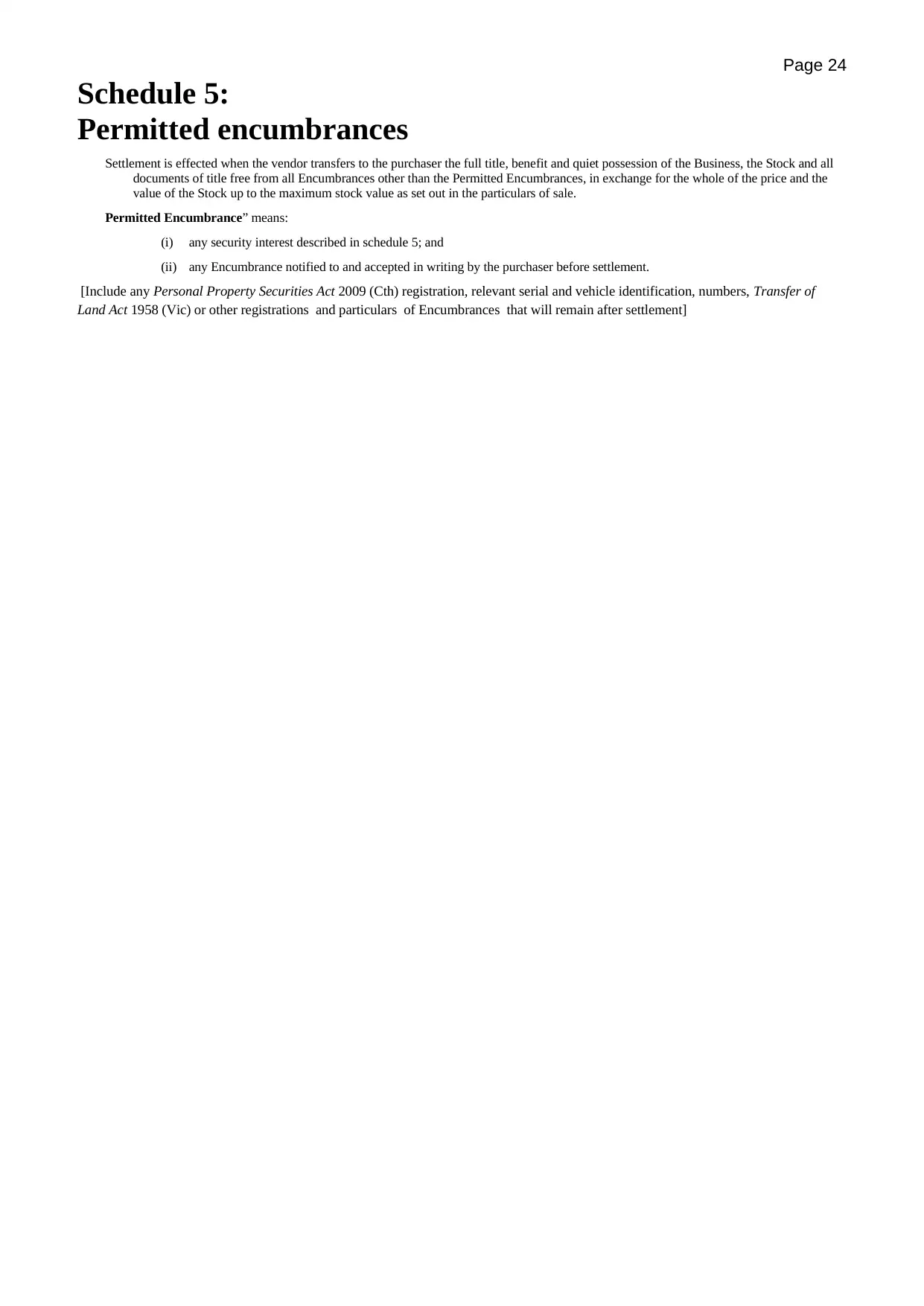
Page 24
Schedule 5:
Permitted encumbrances
Settlement is effected when the vendor transfers to the purchaser the full title, benefit and quiet possession of the Business, the Stock and all
documents of title free from all Encumbrances other than the Permitted Encumbrances, in exchange for the whole of the price and the
value of the Stock up to the maximum stock value as set out in the particulars of sale.
Permitted Encumbrance” means:
(i) any security interest described in schedule 5; and
(ii) any Encumbrance notified to and accepted in writing by the purchaser before settlement.
[Include any Personal Property Securities Act 2009 (Cth) registration, relevant serial and vehicle identification, numbers, Transfer of
Land Act 1958 (Vic) or other registrations and particulars of Encumbrances that will remain after settlement]
Schedule 5:
Permitted encumbrances
Settlement is effected when the vendor transfers to the purchaser the full title, benefit and quiet possession of the Business, the Stock and all
documents of title free from all Encumbrances other than the Permitted Encumbrances, in exchange for the whole of the price and the
value of the Stock up to the maximum stock value as set out in the particulars of sale.
Permitted Encumbrance” means:
(i) any security interest described in schedule 5; and
(ii) any Encumbrance notified to and accepted in writing by the purchaser before settlement.
[Include any Personal Property Securities Act 2009 (Cth) registration, relevant serial and vehicle identification, numbers, Transfer of
Land Act 1958 (Vic) or other registrations and particulars of Encumbrances that will remain after settlement]
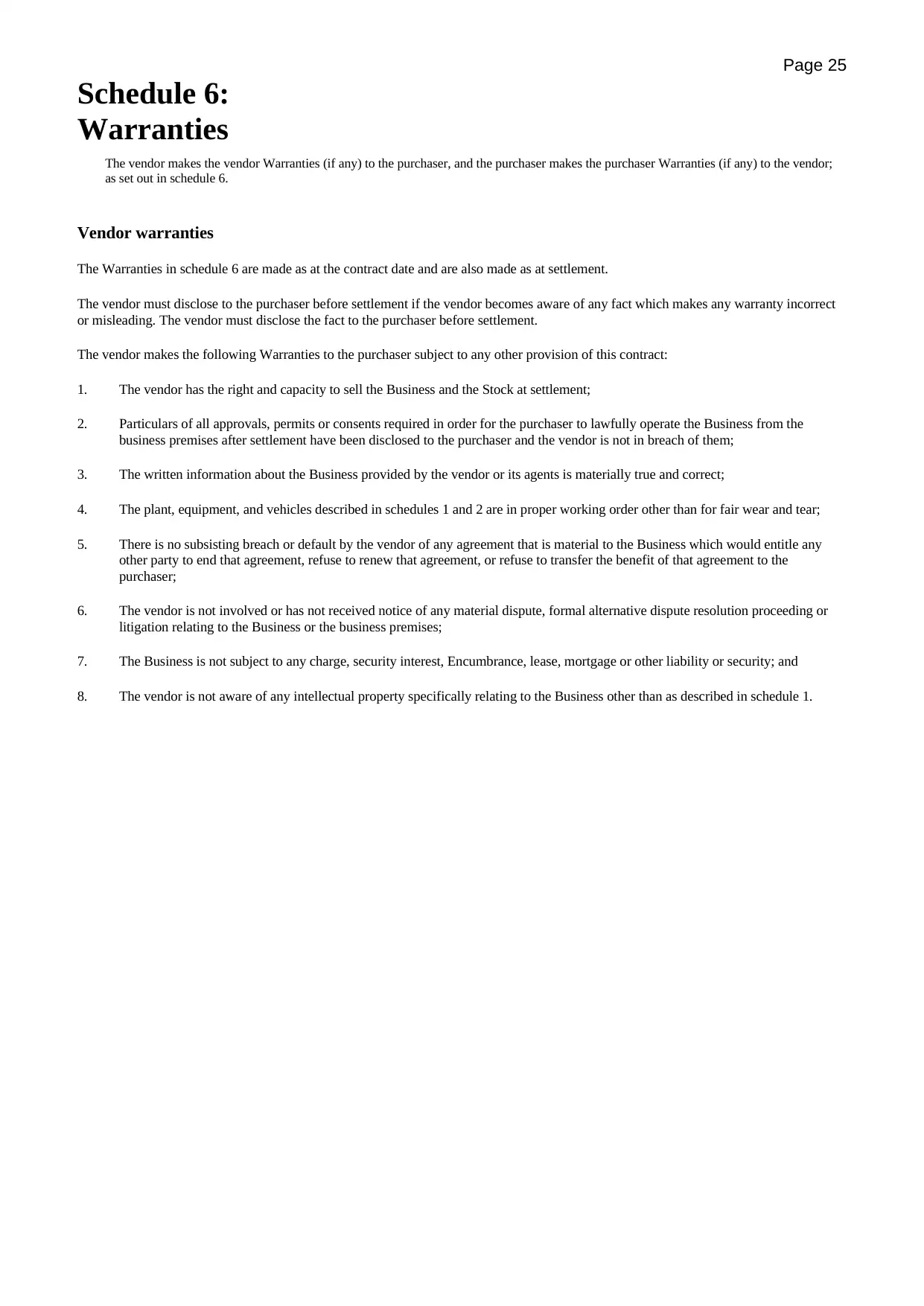
Page 25
Schedule 6:
Warranties
The vendor makes the vendor Warranties (if any) to the purchaser, and the purchaser makes the purchaser Warranties (if any) to the vendor;
as set out in schedule 6.
Vendor warranties
The Warranties in schedule 6 are made as at the contract date and are also made as at settlement.
The vendor must disclose to the purchaser before settlement if the vendor becomes aware of any fact which makes any warranty incorrect
or misleading. The vendor must disclose the fact to the purchaser before settlement.
The vendor makes the following Warranties to the purchaser subject to any other provision of this contract:
1. The vendor has the right and capacity to sell the Business and the Stock at settlement;
2. Particulars of all approvals, permits or consents required in order for the purchaser to lawfully operate the Business from the
business premises after settlement have been disclosed to the purchaser and the vendor is not in breach of them;
3. The written information about the Business provided by the vendor or its agents is materially true and correct;
4. The plant, equipment, and vehicles described in schedules 1 and 2 are in proper working order other than for fair wear and tear;
5. There is no subsisting breach or default by the vendor of any agreement that is material to the Business which would entitle any
other party to end that agreement, refuse to renew that agreement, or refuse to transfer the benefit of that agreement to the
purchaser;
6. The vendor is not involved or has not received notice of any material dispute, formal alternative dispute resolution proceeding or
litigation relating to the Business or the business premises;
7. The Business is not subject to any charge, security interest, Encumbrance, lease, mortgage or other liability or security; and
8. The vendor is not aware of any intellectual property specifically relating to the Business other than as described in schedule 1.
Schedule 6:
Warranties
The vendor makes the vendor Warranties (if any) to the purchaser, and the purchaser makes the purchaser Warranties (if any) to the vendor;
as set out in schedule 6.
Vendor warranties
The Warranties in schedule 6 are made as at the contract date and are also made as at settlement.
The vendor must disclose to the purchaser before settlement if the vendor becomes aware of any fact which makes any warranty incorrect
or misleading. The vendor must disclose the fact to the purchaser before settlement.
The vendor makes the following Warranties to the purchaser subject to any other provision of this contract:
1. The vendor has the right and capacity to sell the Business and the Stock at settlement;
2. Particulars of all approvals, permits or consents required in order for the purchaser to lawfully operate the Business from the
business premises after settlement have been disclosed to the purchaser and the vendor is not in breach of them;
3. The written information about the Business provided by the vendor or its agents is materially true and correct;
4. The plant, equipment, and vehicles described in schedules 1 and 2 are in proper working order other than for fair wear and tear;
5. There is no subsisting breach or default by the vendor of any agreement that is material to the Business which would entitle any
other party to end that agreement, refuse to renew that agreement, or refuse to transfer the benefit of that agreement to the
purchaser;
6. The vendor is not involved or has not received notice of any material dispute, formal alternative dispute resolution proceeding or
litigation relating to the Business or the business premises;
7. The Business is not subject to any charge, security interest, Encumbrance, lease, mortgage or other liability or security; and
8. The vendor is not aware of any intellectual property specifically relating to the Business other than as described in schedule 1.
Paraphrase This Document
Need a fresh take? Get an instant paraphrase of this document with our AI Paraphraser

Page 26
Purchaser warranties:
The purchaser makes the following Warranties to the vendor:
1. The purchaser will be qualified and authorised to conduct the Business at settlement.
Purchaser warranties:
The purchaser makes the following Warranties to the vendor:
1. The purchaser will be qualified and authorised to conduct the Business at settlement.
1 out of 26
Related Documents
Your All-in-One AI-Powered Toolkit for Academic Success.
+13062052269
info@desklib.com
Available 24*7 on WhatsApp / Email
![[object Object]](/_next/static/media/star-bottom.7253800d.svg)
Unlock your academic potential
© 2024 | Zucol Services PVT LTD | All rights reserved.




